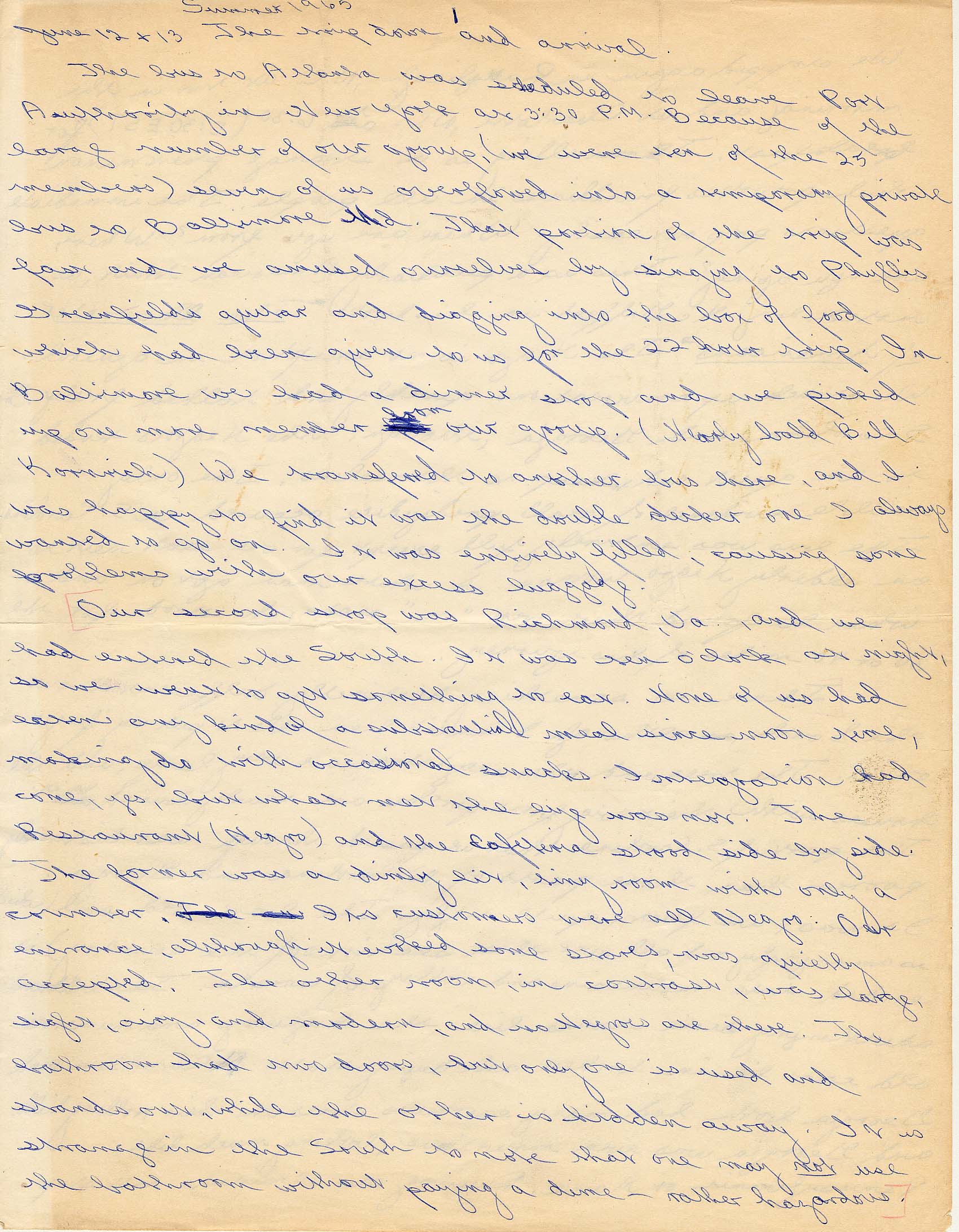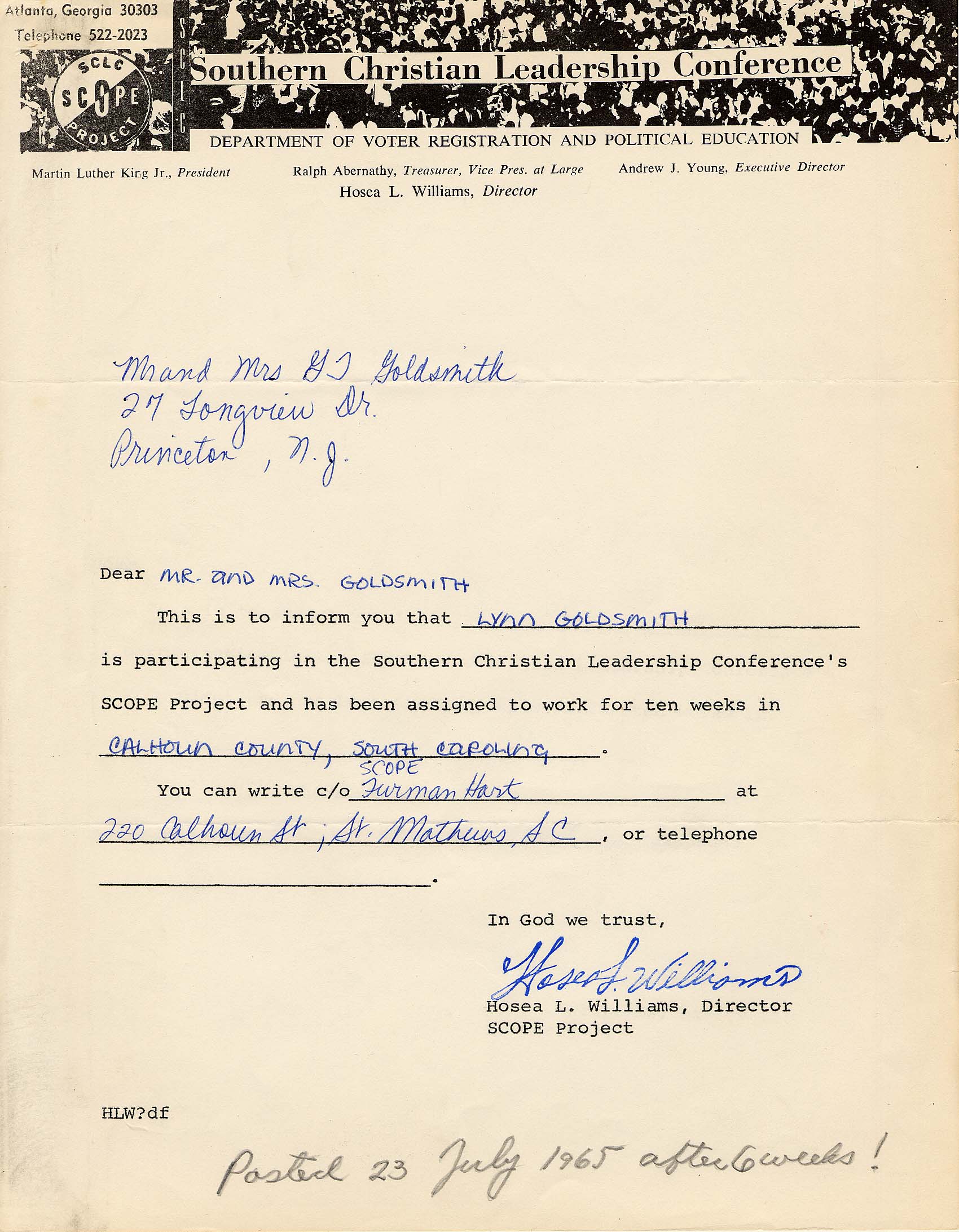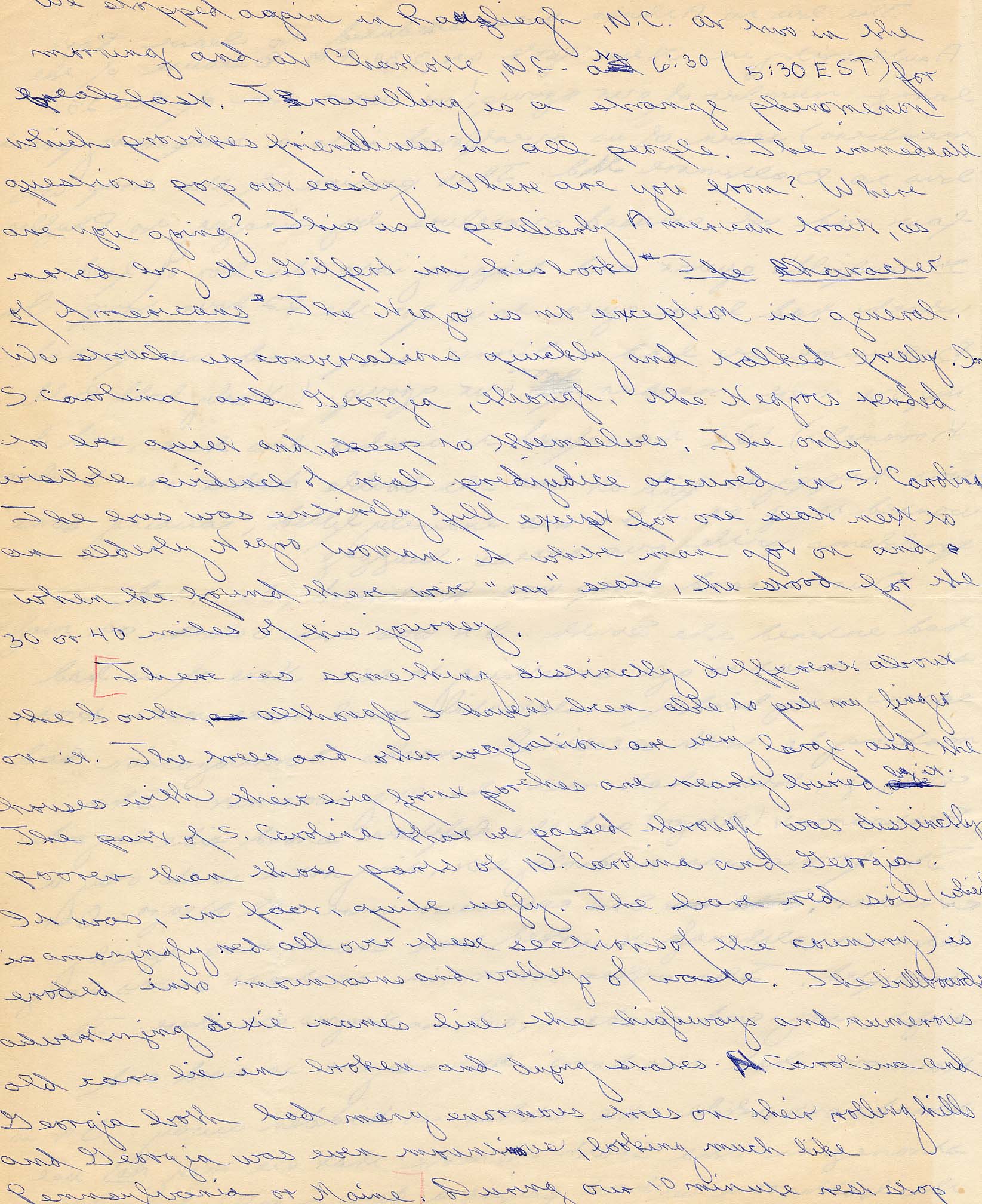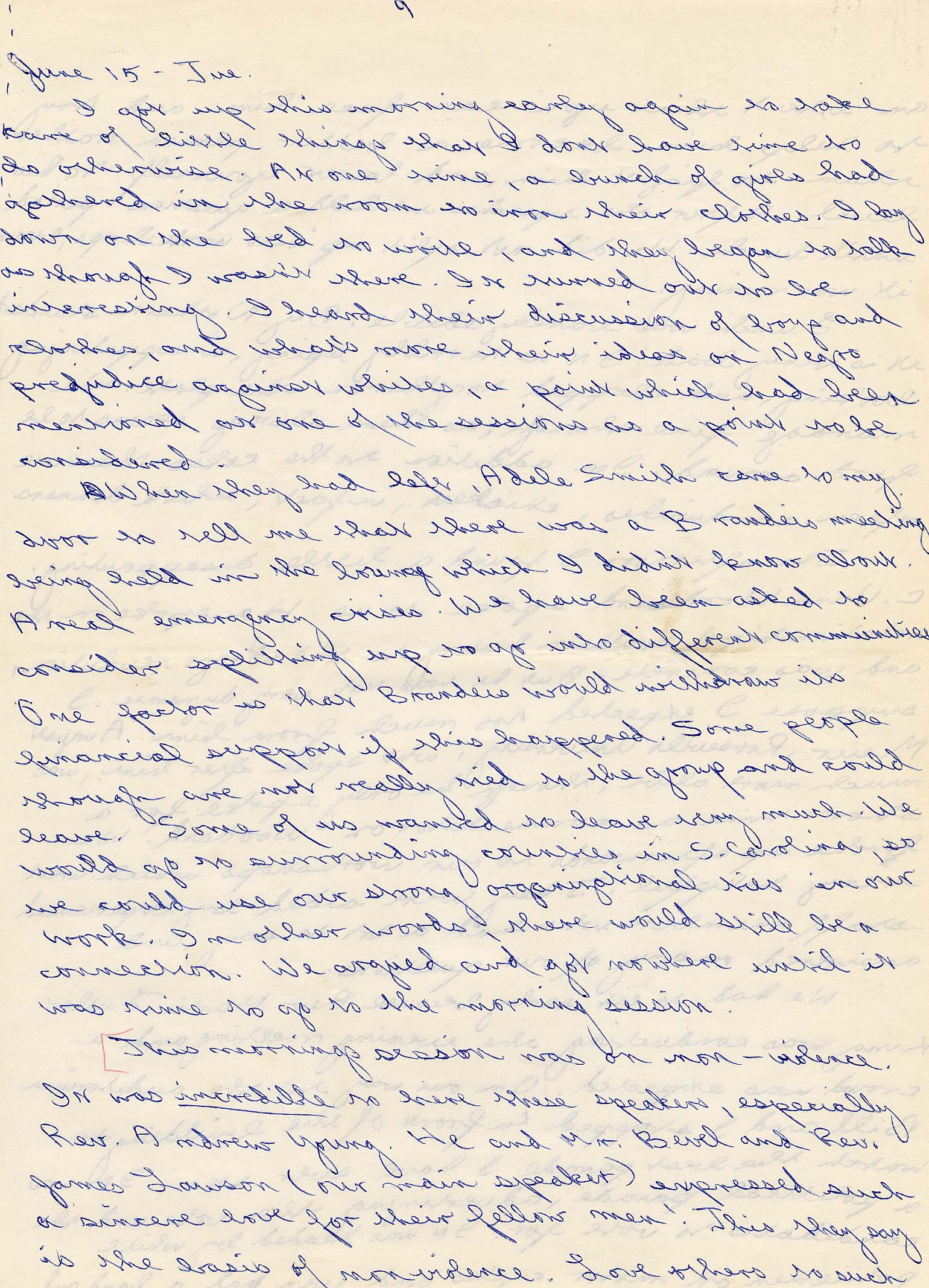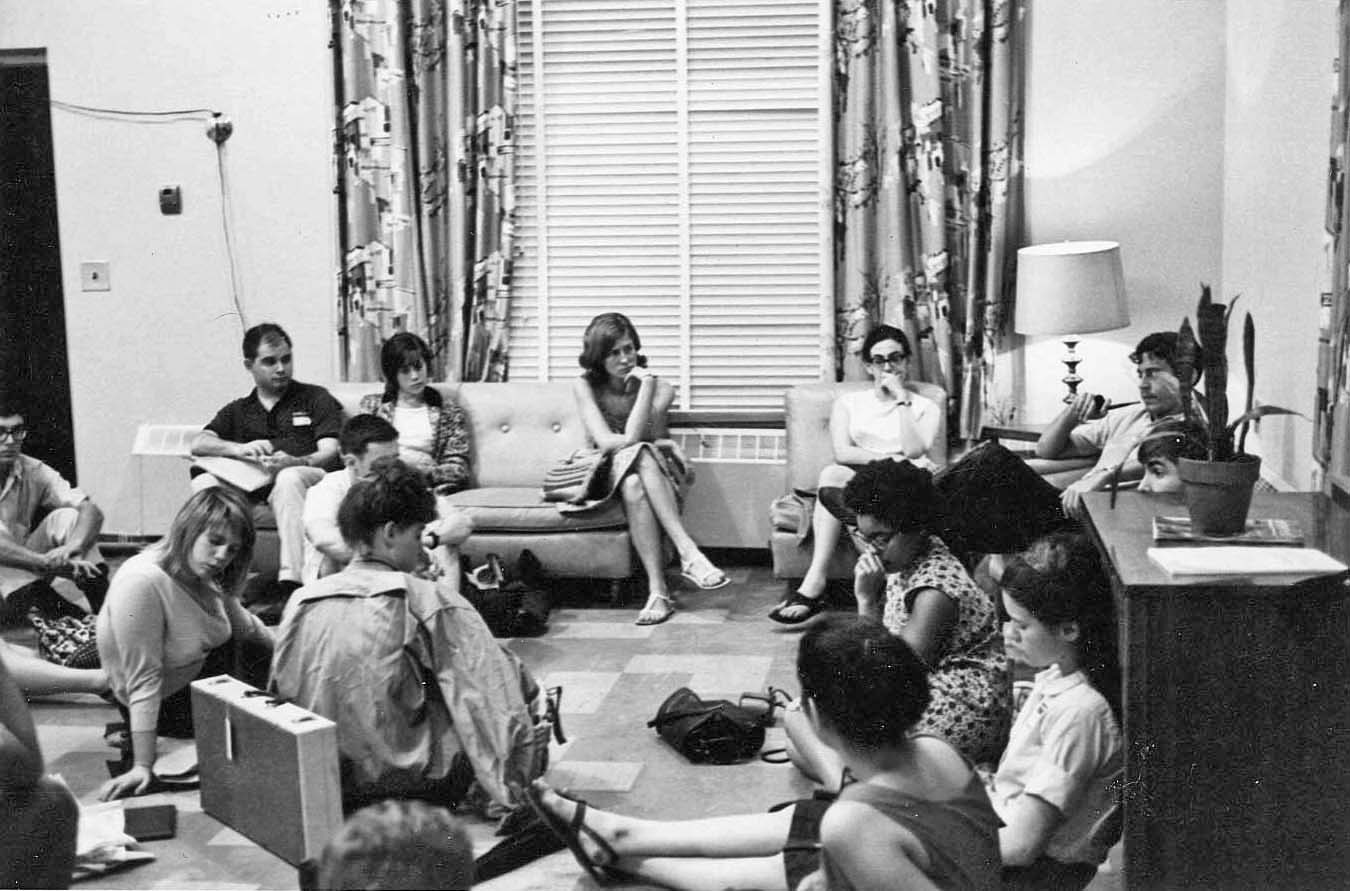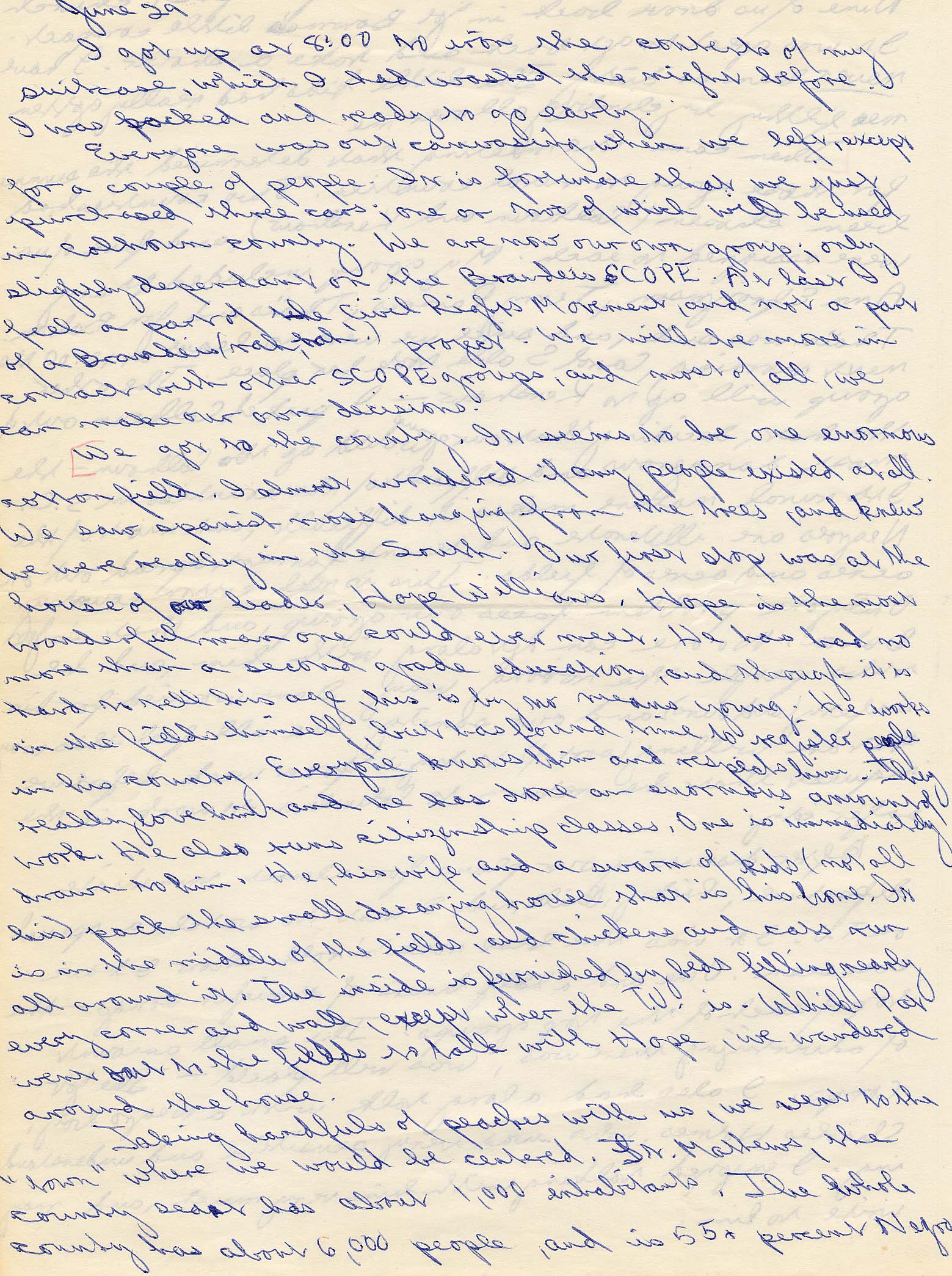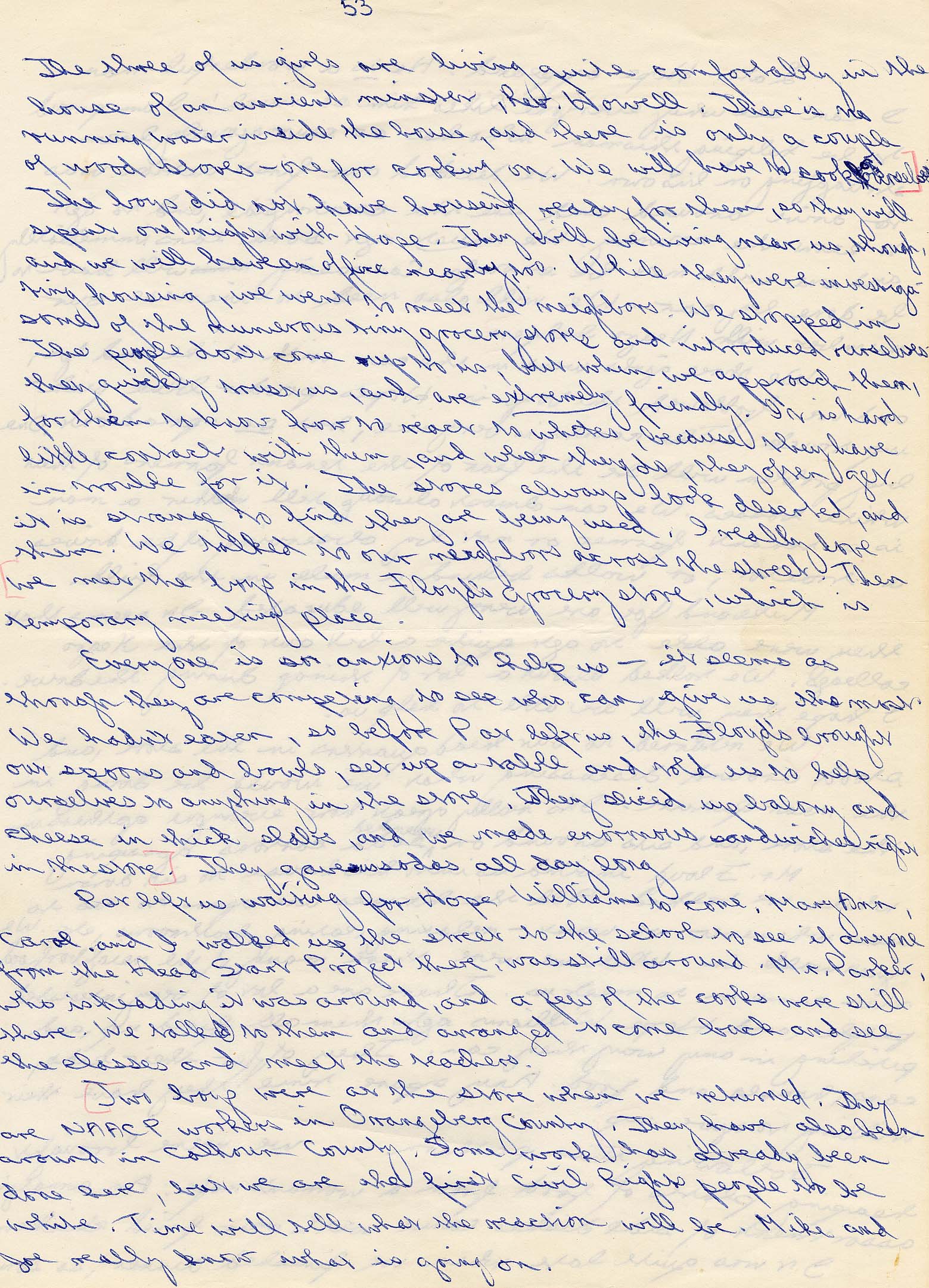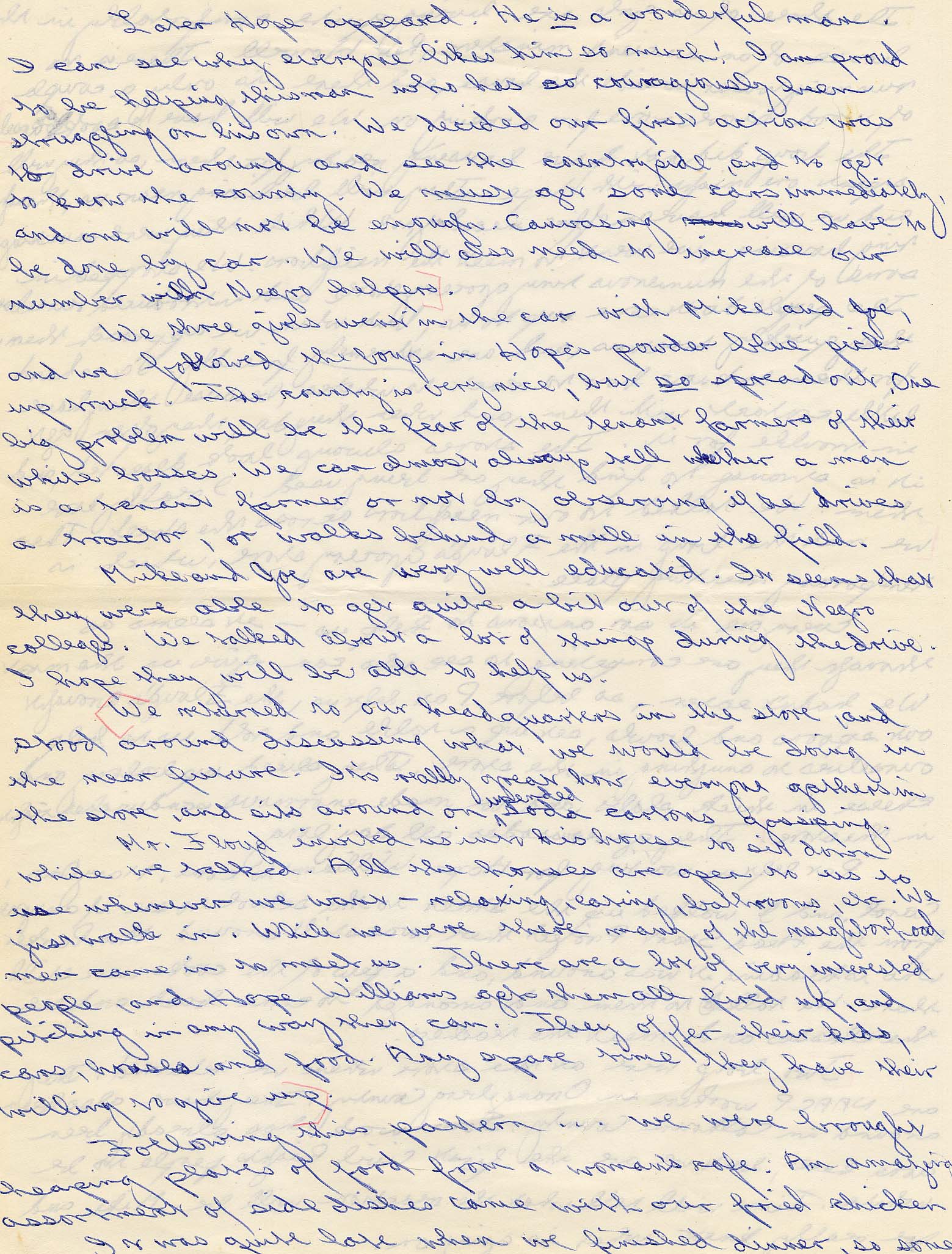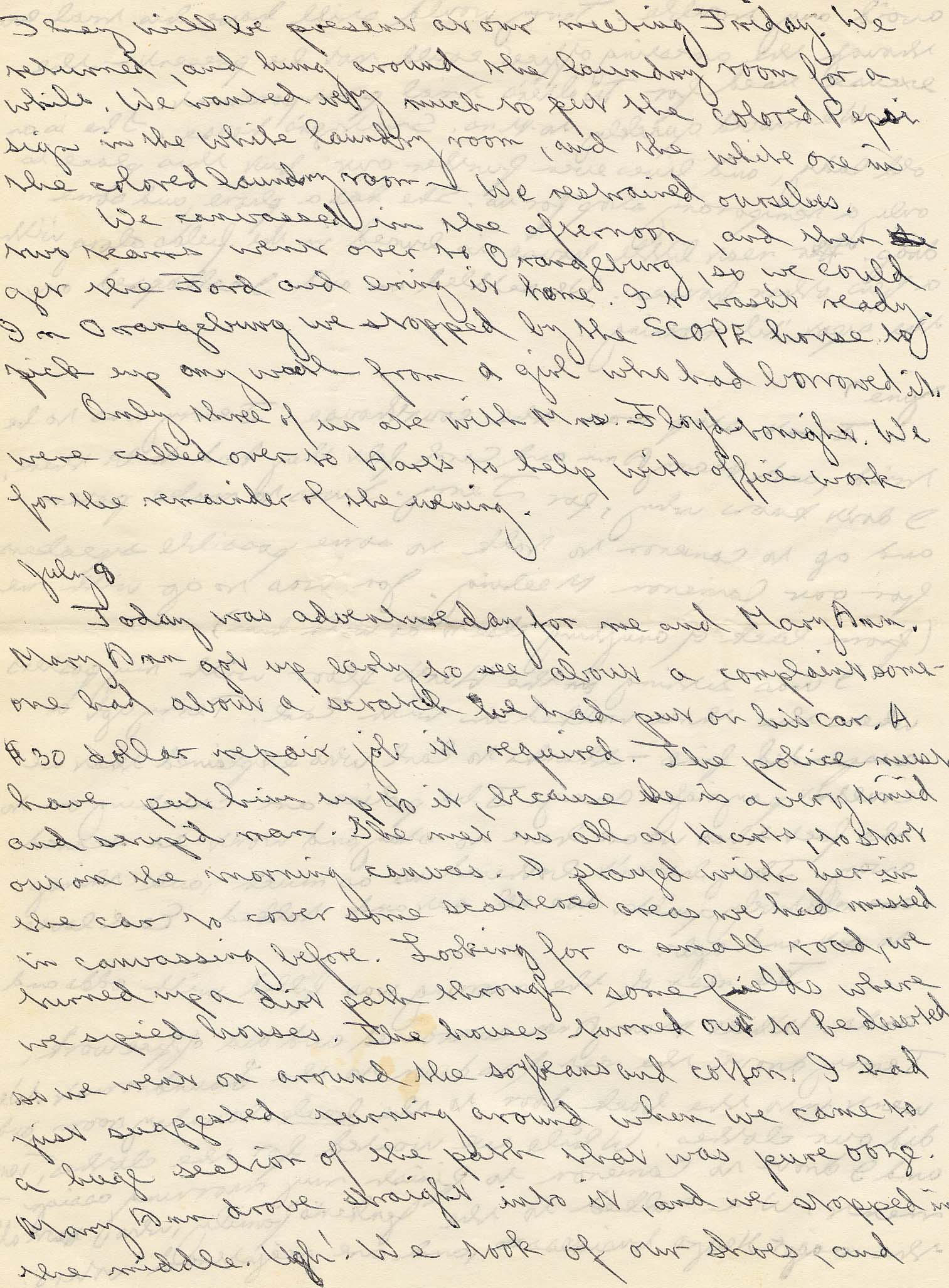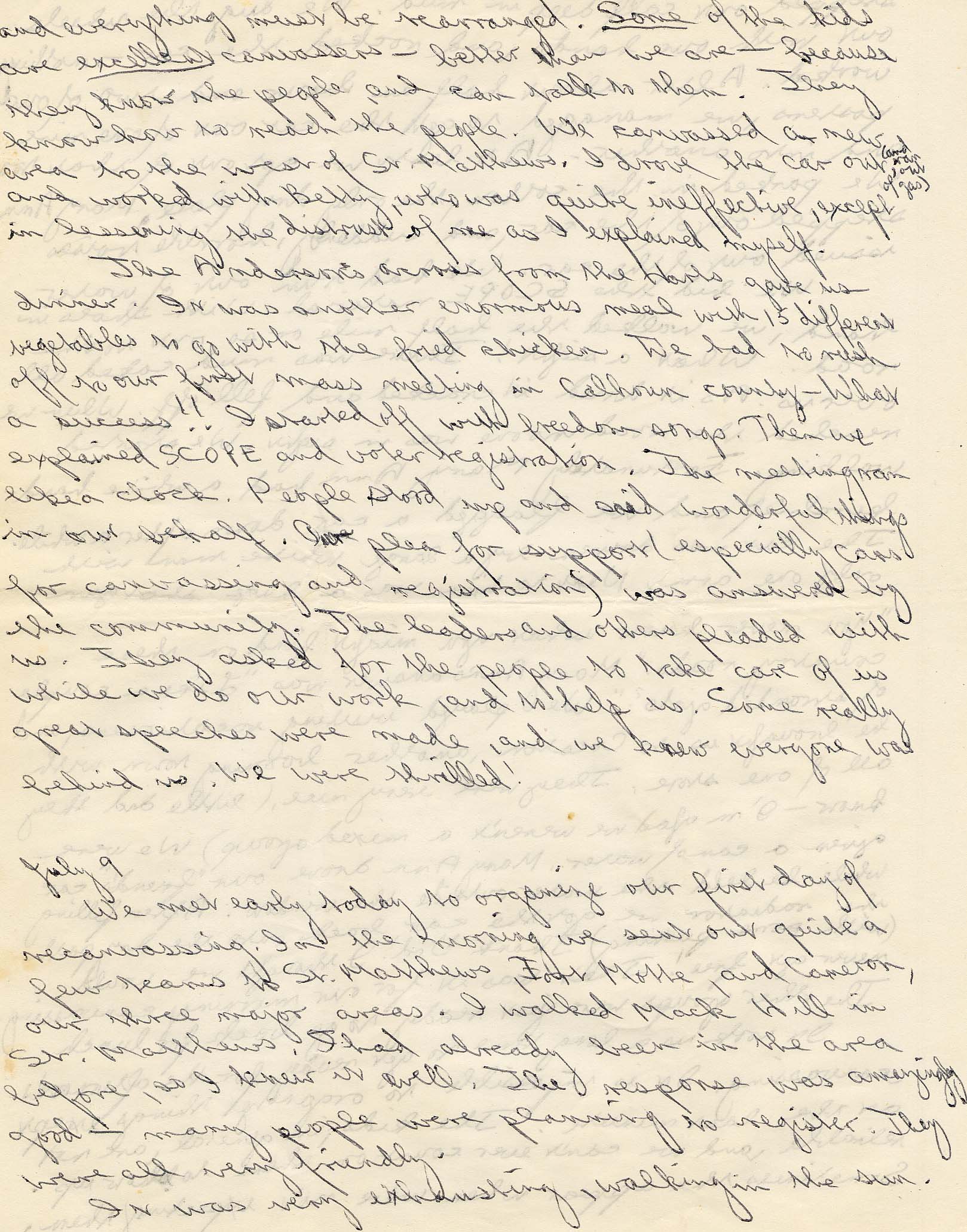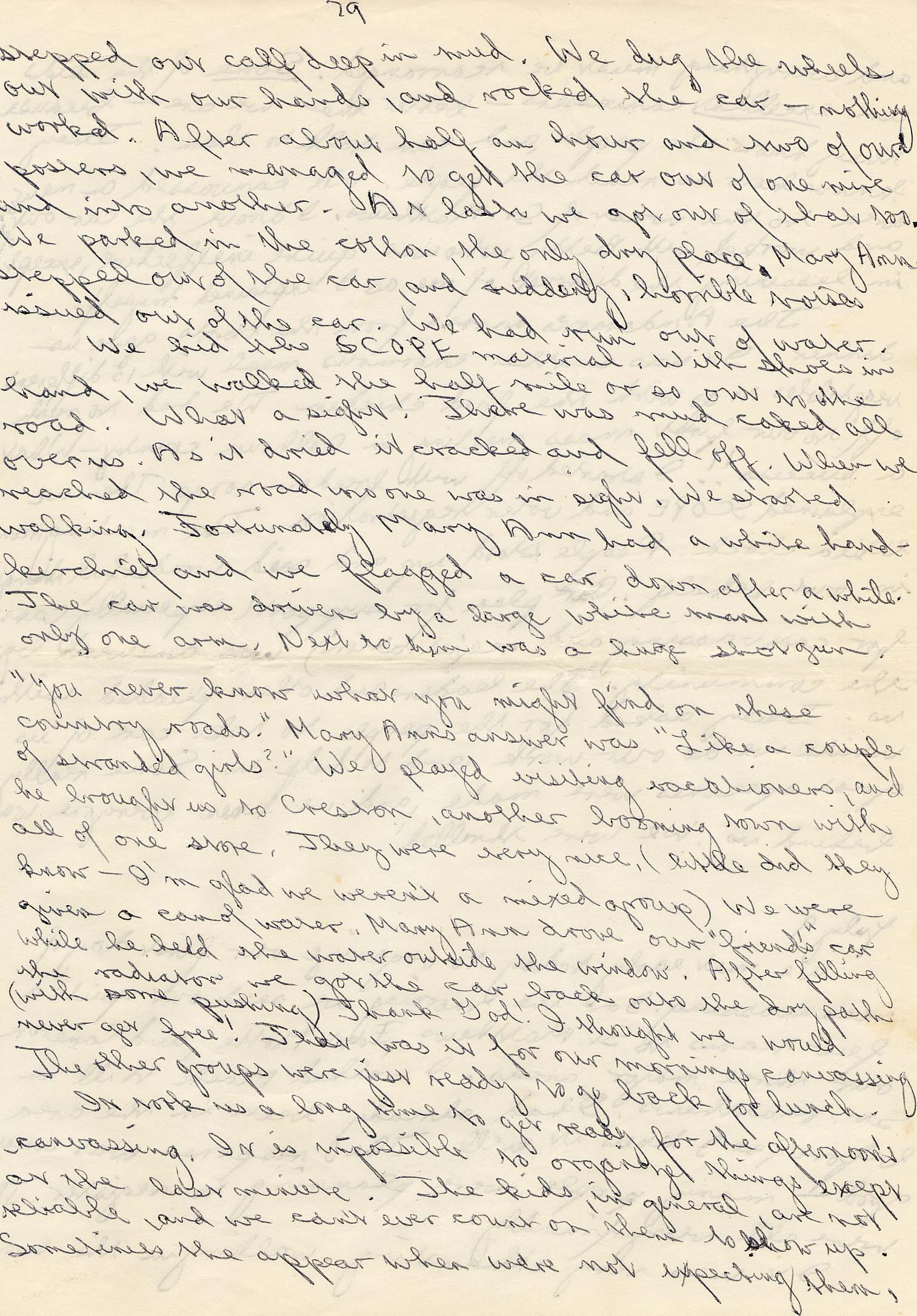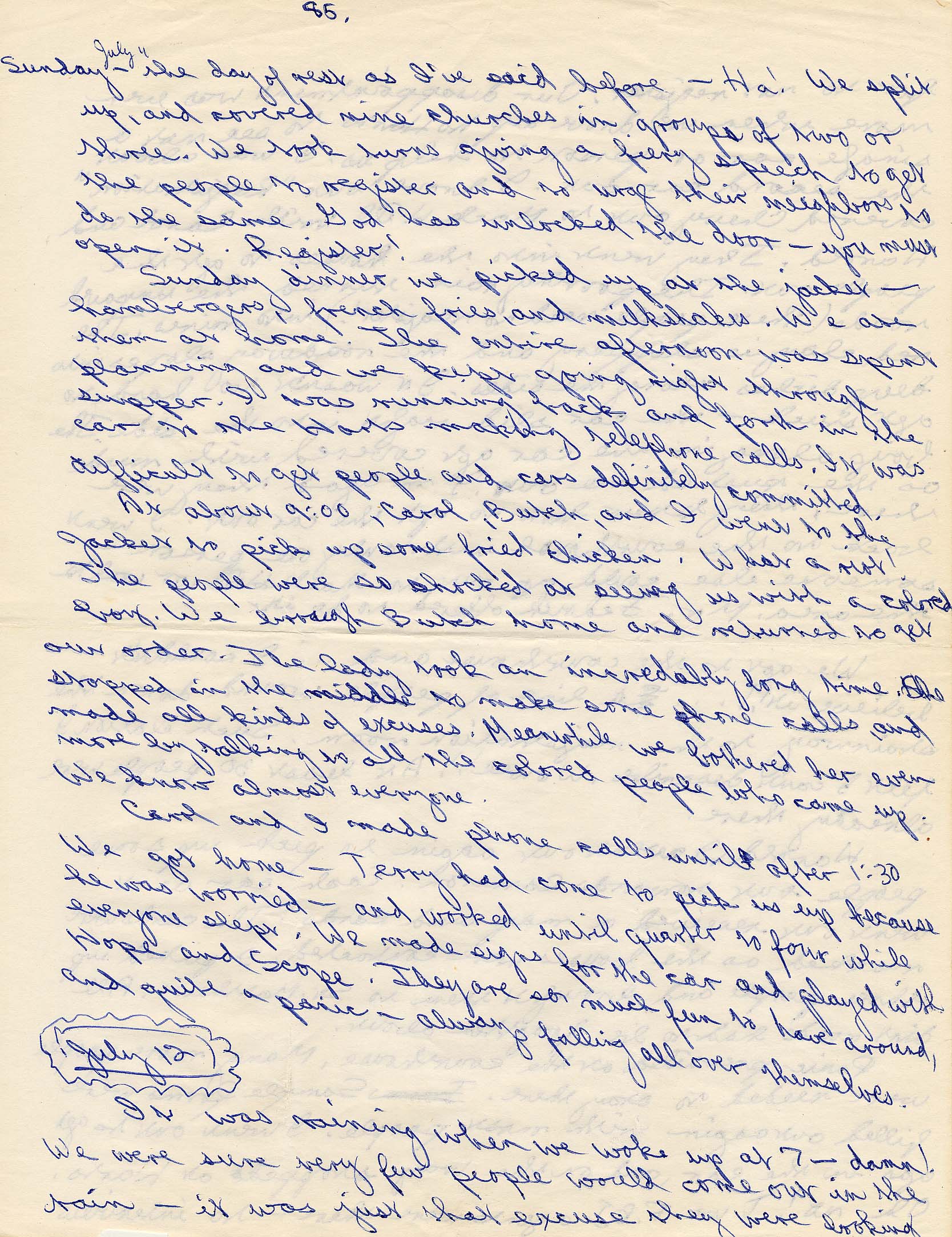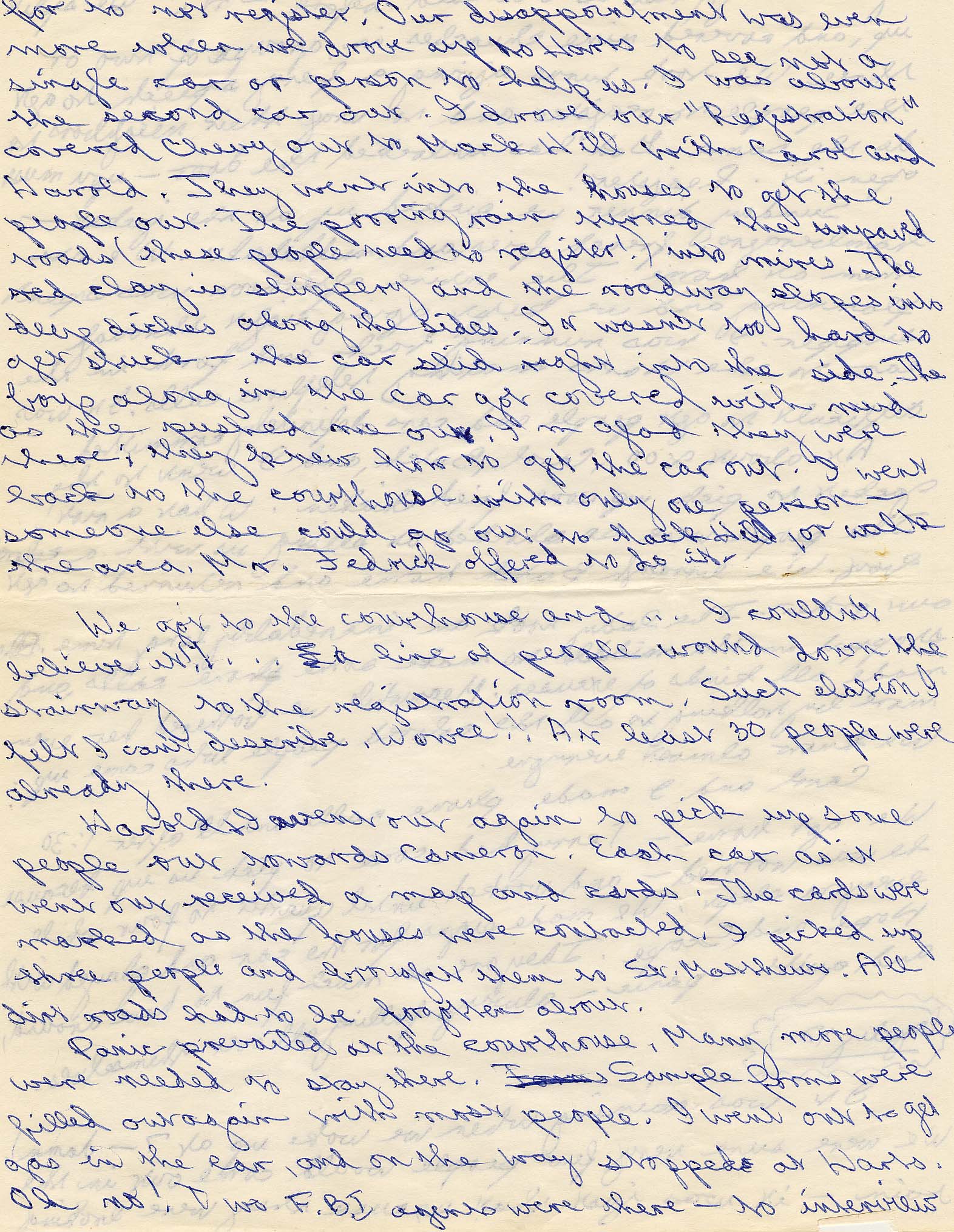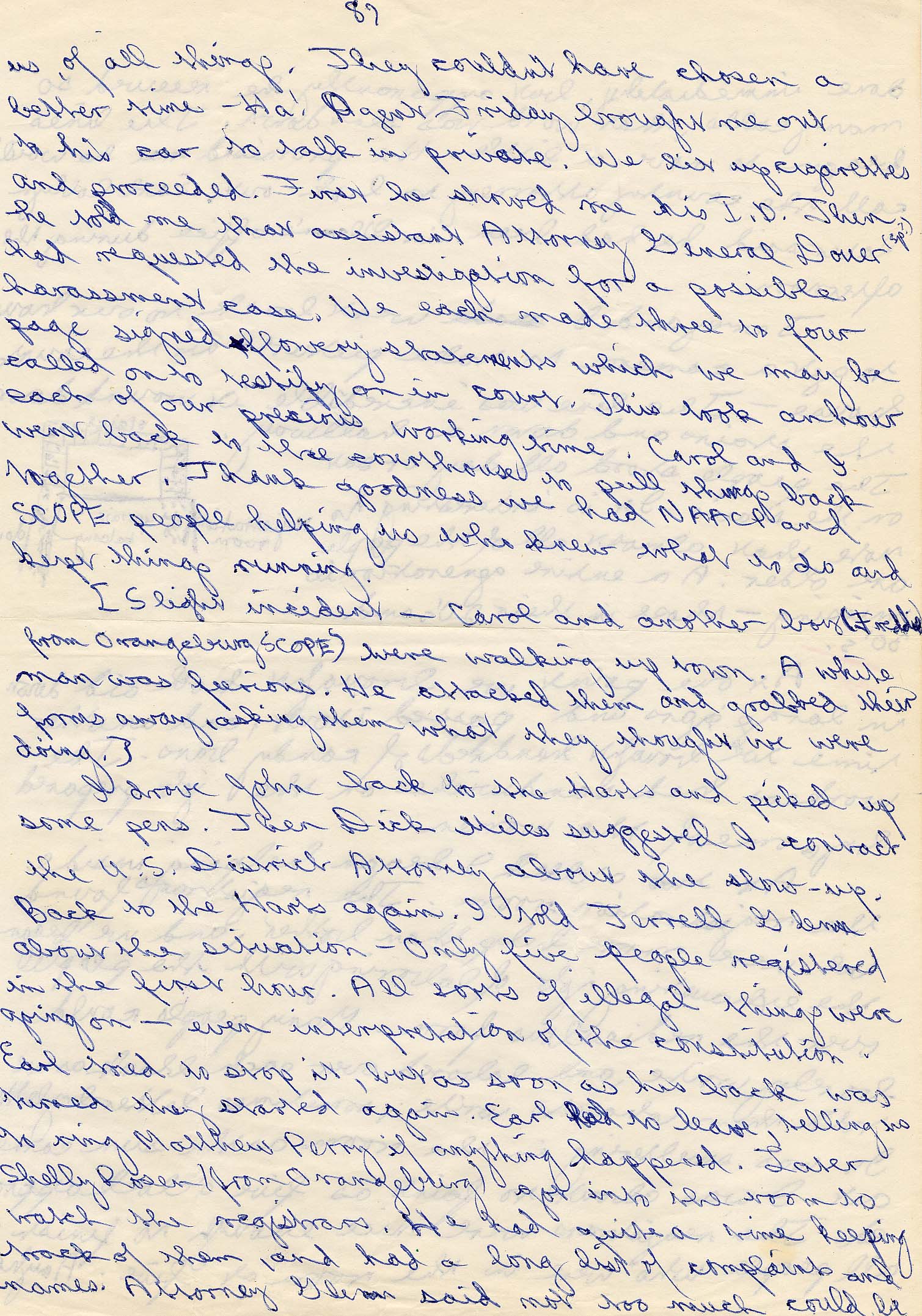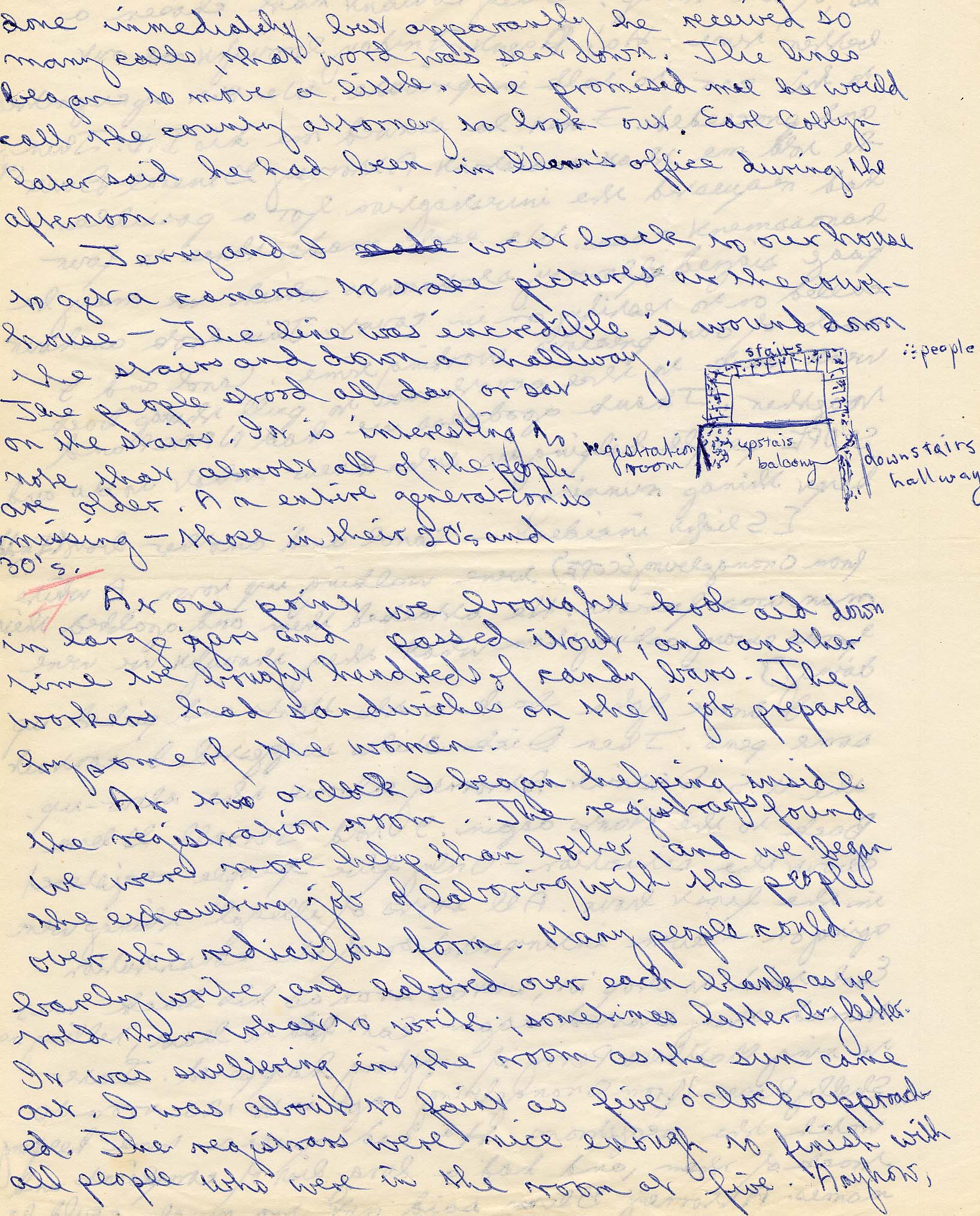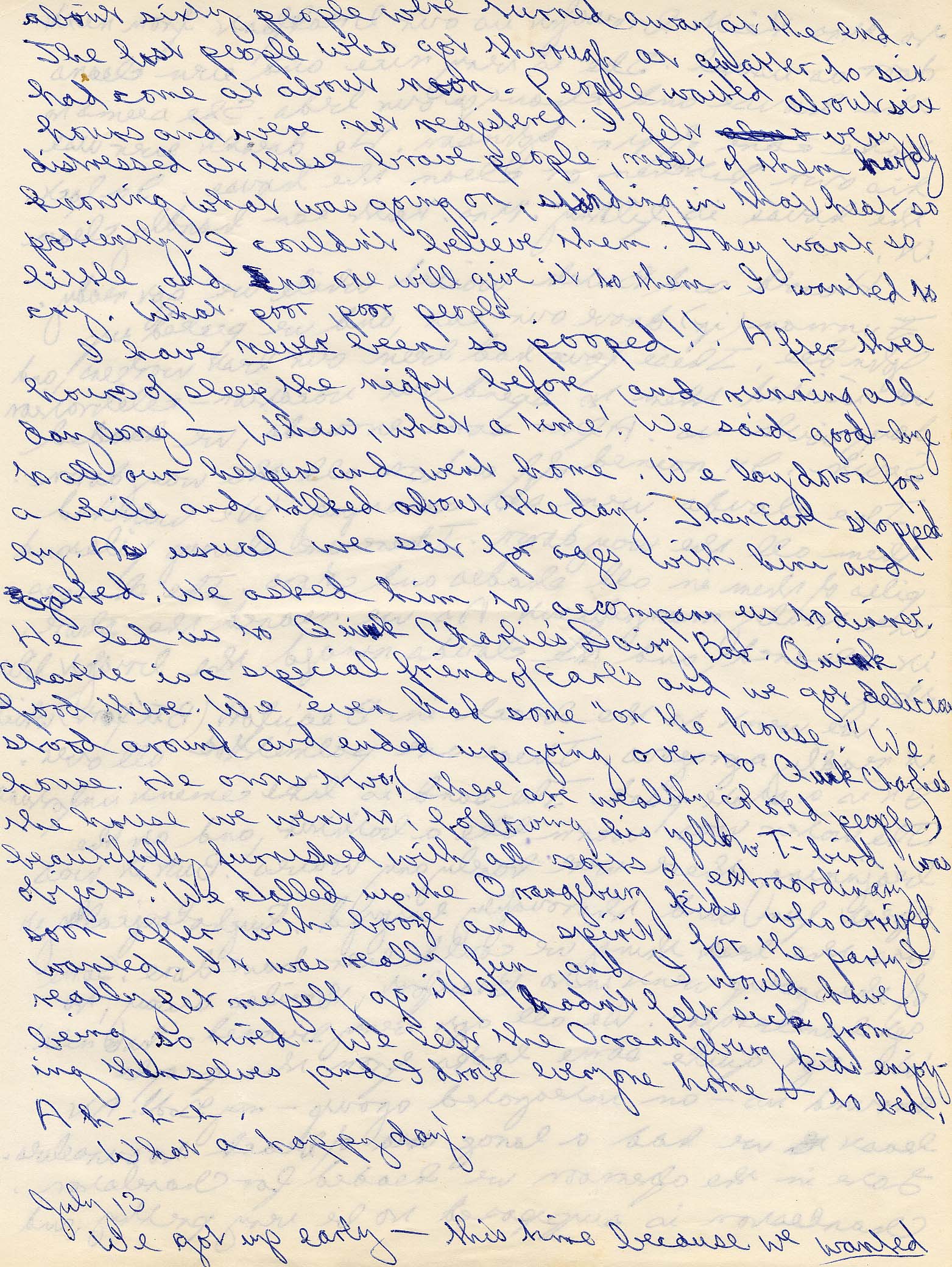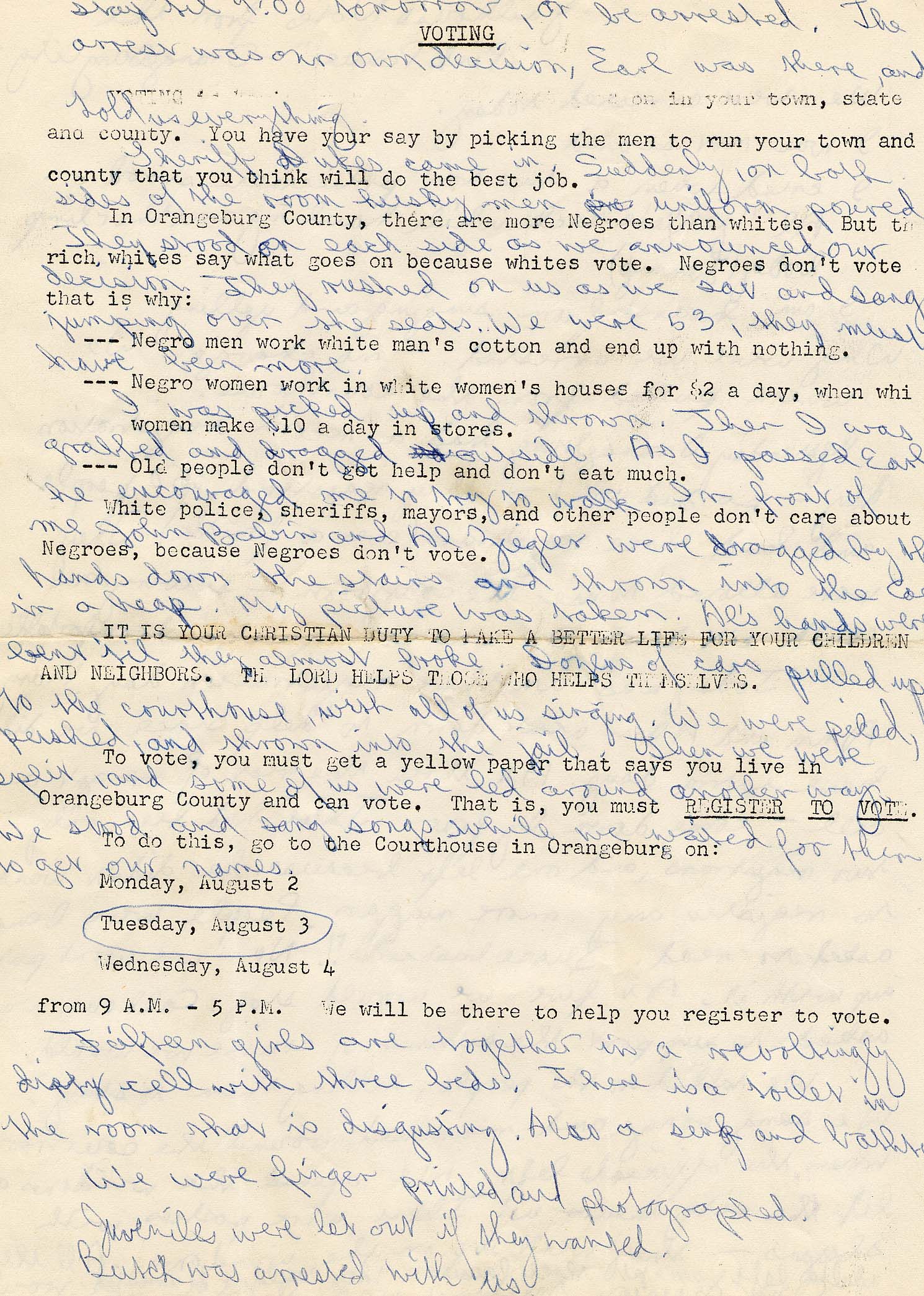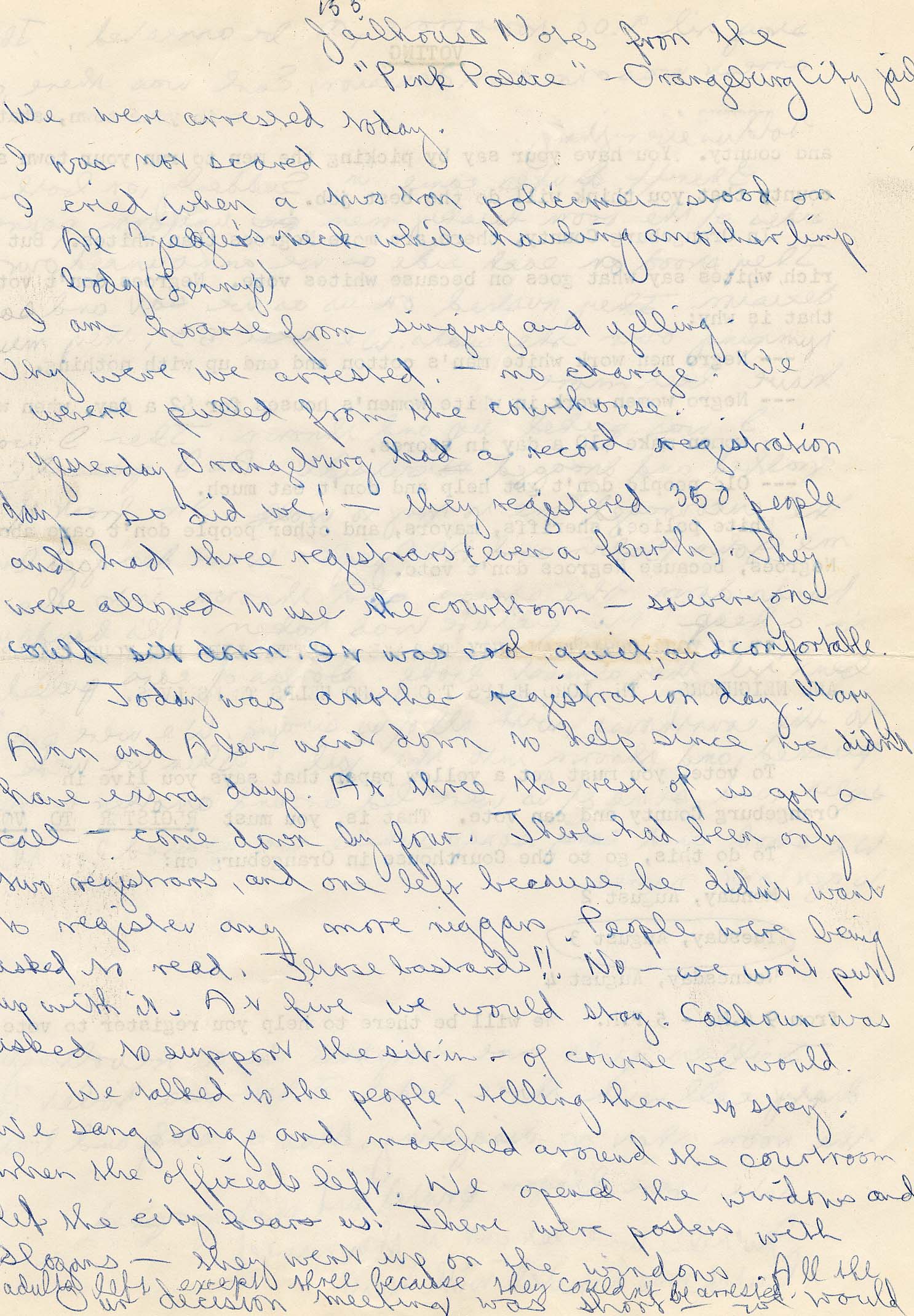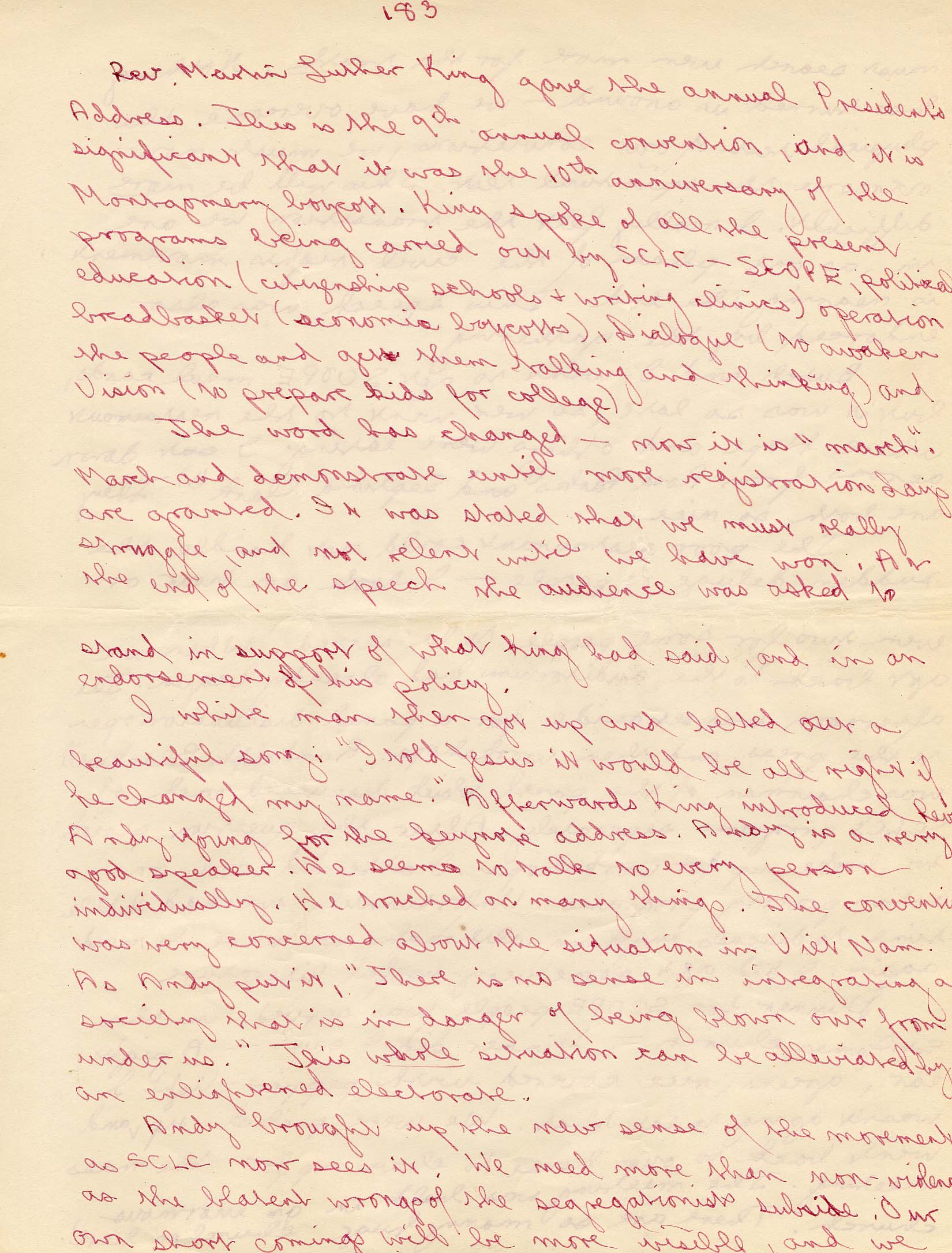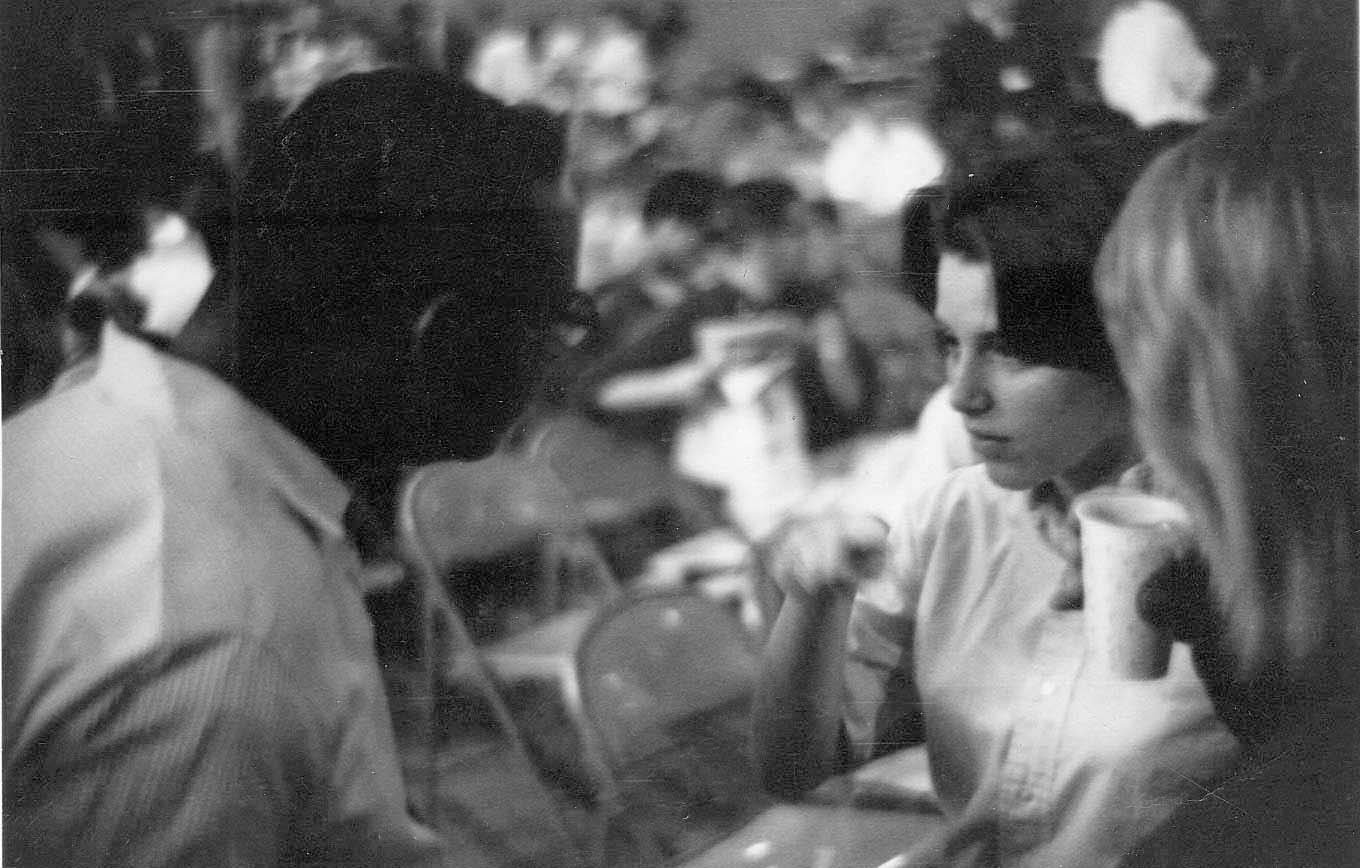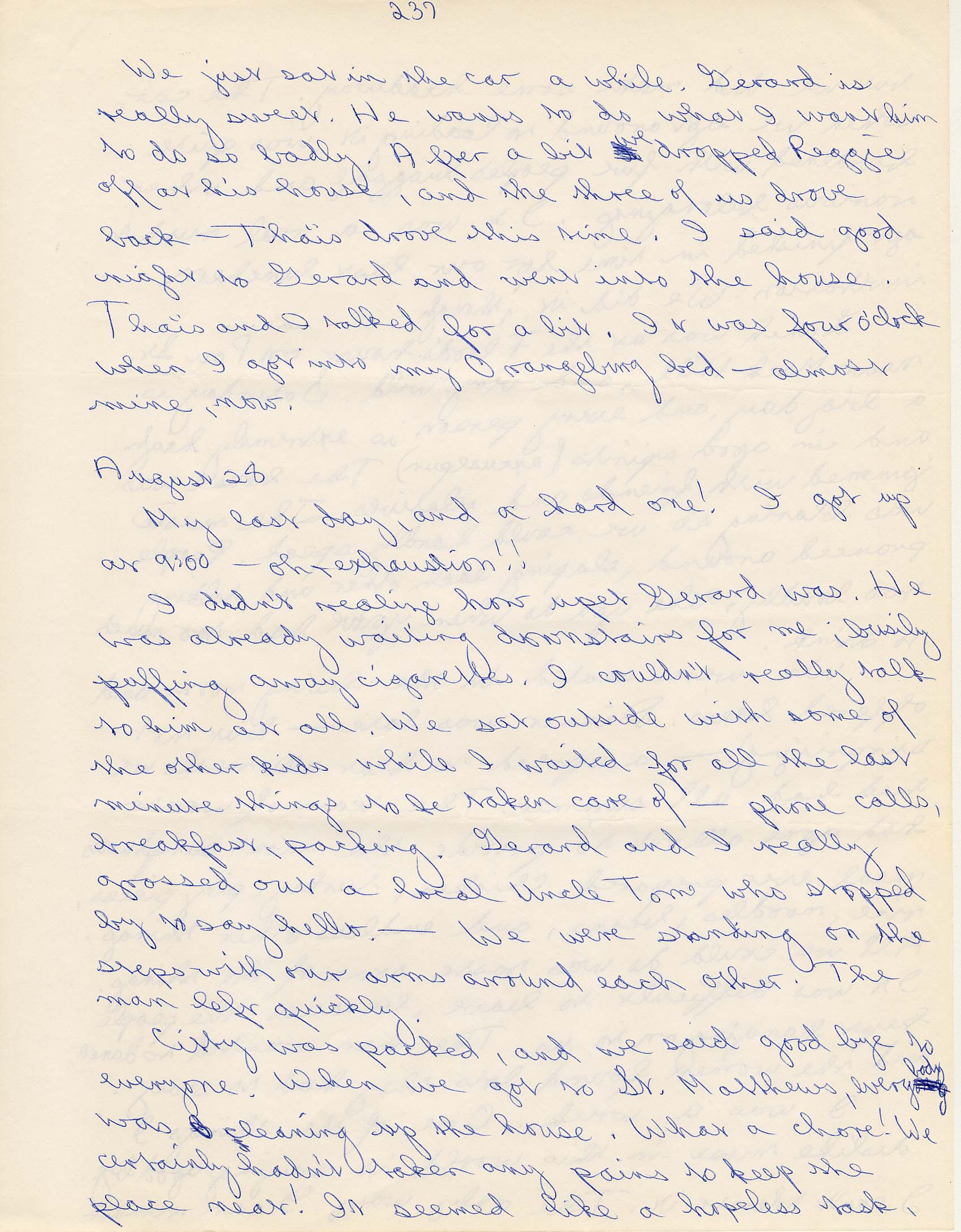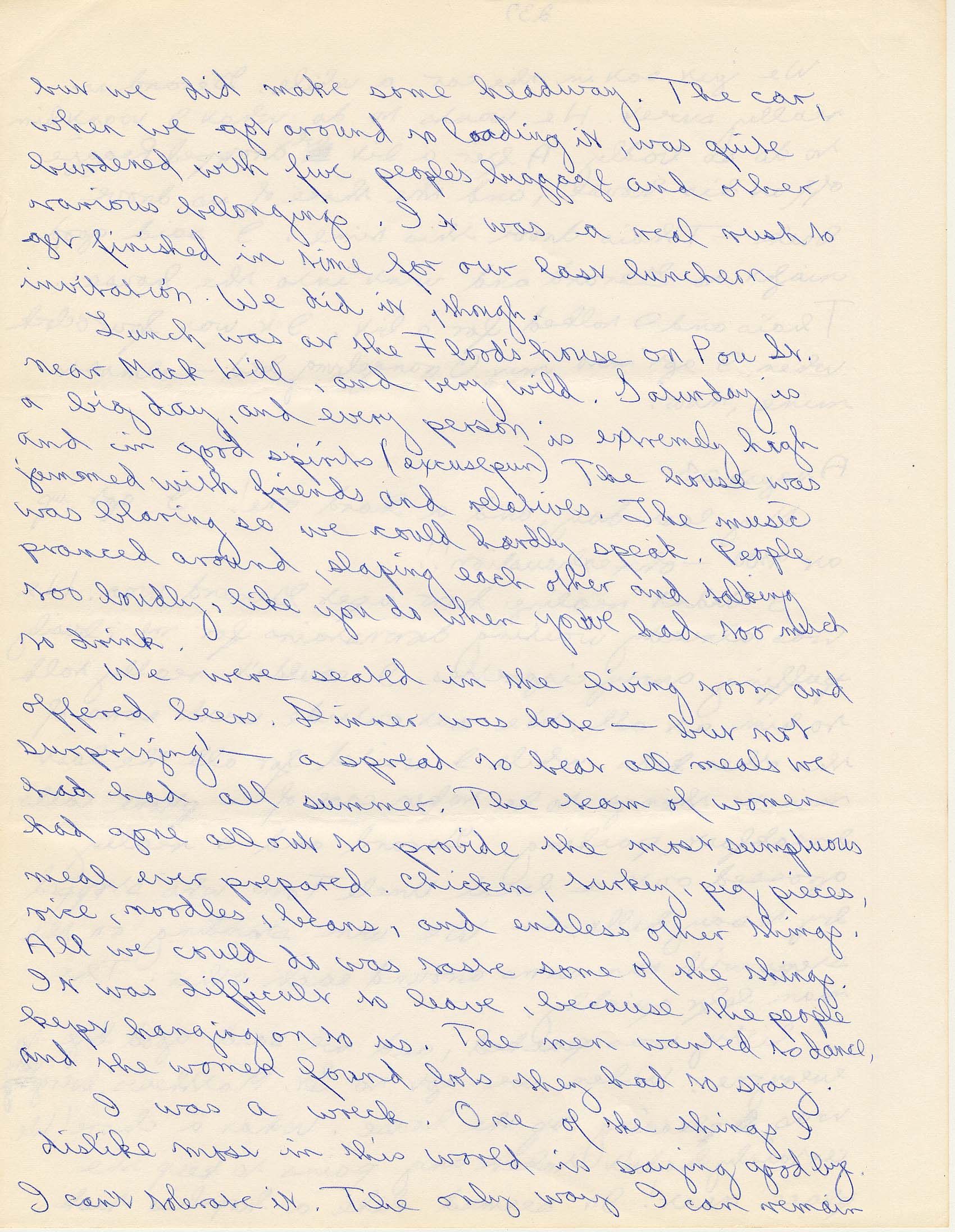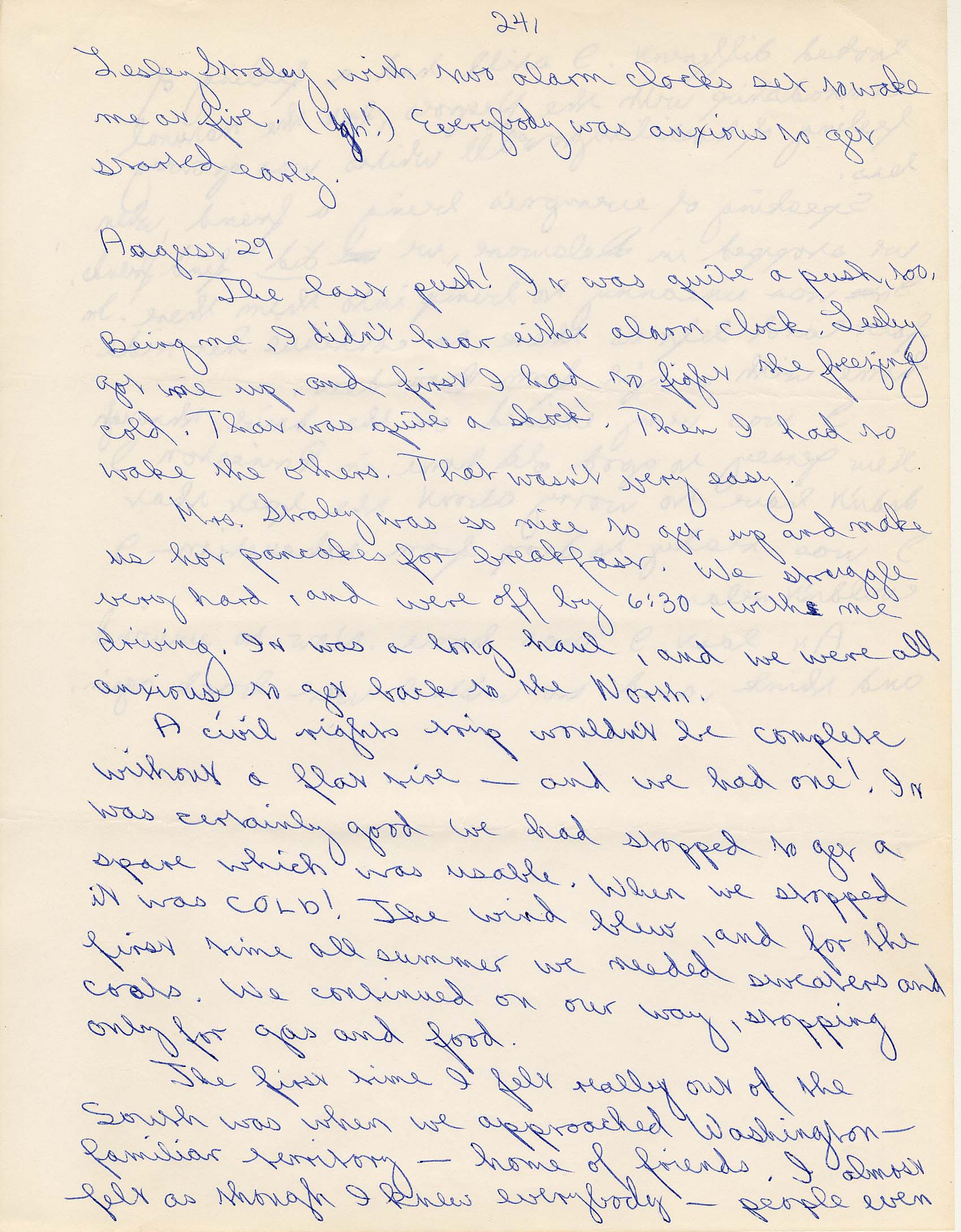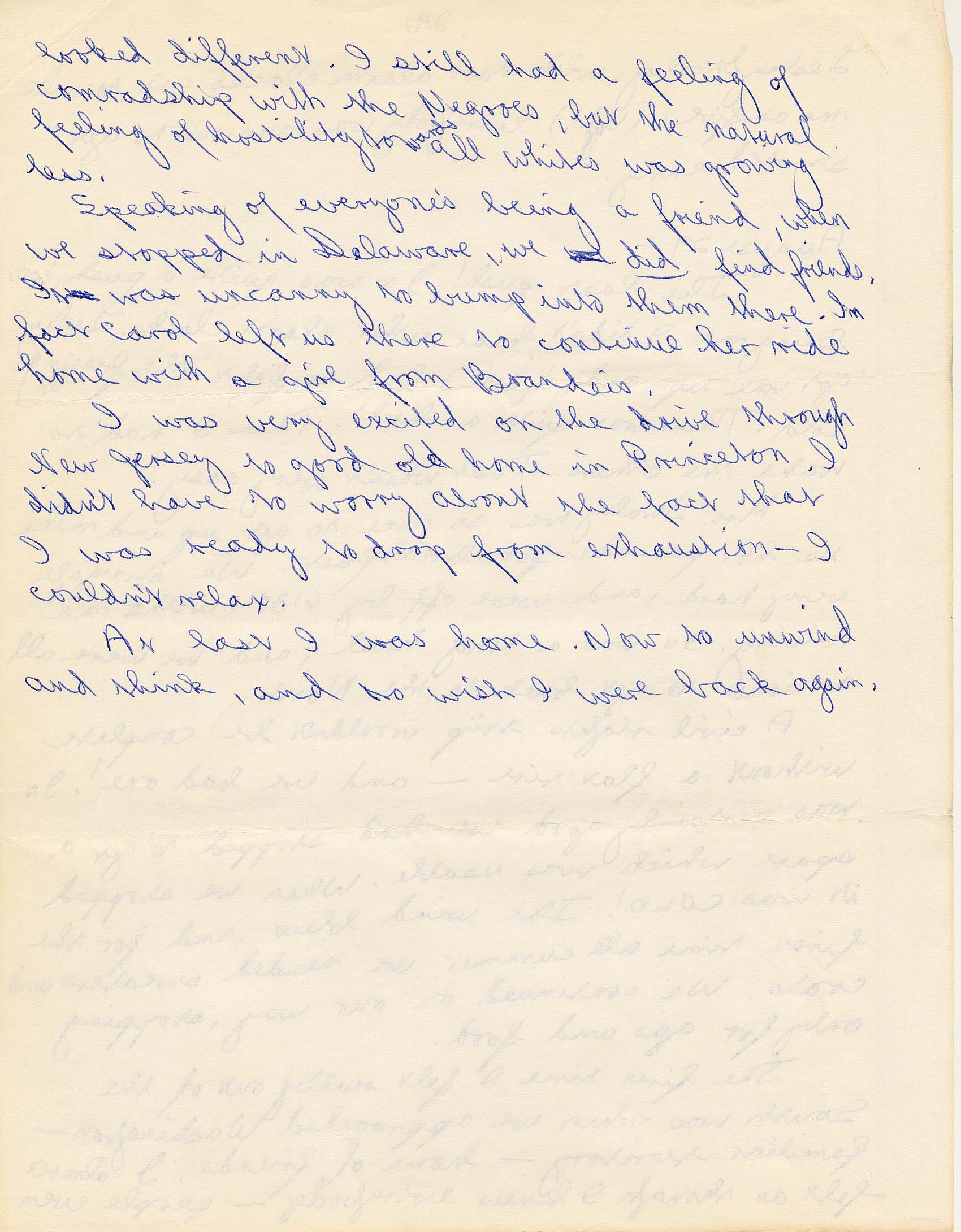Diary: June - August 1965
Summer 1965 — June 12 and 13: The Trip Down and Arrival
The bus to Atlanta was scheduled to leave Port Authority in New York at 3:30 p.m.. Because of the large number of our group, (we were ten of the 25 members) seven of us overflowed into a temporary private bus to Baltimore, MD. That portion of the trip was fast and we amused ourselves by singing to Phyllis’ guitar and digging into the box of food which had been given to us for the 22 hour trip. In Baltimore we had a dinner stop and we picked up one more member from our group, Bill. We transferred to another bus here, and I was happy to find it was the double-decker one I always wanted to go on. It was entirely filled, causing some problems with our excess baggage.
Our second stop was Richmond, V.A., and we had entered the South. It was ten o’clock at night, so we went to get something to eat. None of us had eaten any kind of substantial meal since noon time, making do with occasional snacks. Integration had come, yes, but what met the eye was not. The restaurant (Negro) and the cafeteria stood side by side. The former was a dimly lit, tiny room with only a counter. Its customers were all Negro. Our entrance, although it evoked some stares, was quietly accepted. The other room, in contrast, was large light, airy and modern, and no Negros are there. The bathroom had two doors, but only one is used and stands out, while the other is hidden away. It is strange in the South to note that one may not use the bathroom without paying a dime — rather hazardous.
We stopped again at Raleigh, N.C. at two in the morning and at Charlotte, N.C. at 6:30 for breakfast. Travelling is a strange phenomenon which provokes friendliness in all people. The immediate questions pop out easily. Where are you from? Where are you going? This is a peculiarly American trait, as noted by Mc. Giffert in his book “The Character of Americans”. The Negro is no exception in general. We struck up conversations quickly and talked freely. In S. Carolina and Georgia, though, the Negroes tended to be quiet and keep to themselves. The only visible evidence of real prejudice occurred in S. Carolina. The bus was entirely full except for one seat next to an elderly Negro woman. A white man got on and when he found there were “no” seats, he stood for the 30 or 40 minutes of his journey.
There is something distinctly different about the South, although I haven’t been able to put my finger on it. The trees and other vegetation are very large, and the houses with their big front porches are nearly buried in it. The part of S. Carolina that we passed through was distinctly poorer than those parts of N. Carolina and Georgia. It was, in fact, quite ugly. The bare red soil (which is amazingly red all over these sections of the country) is eroded into mountains and valleys of waste. The billboards advertising Dixie names line the highways and numerous old cars lie in broken and dying states. N. Carolina and Georgia both had many enormous trees on their rolling hills, and Georgia was even mountainous, looking much like Pennsylvania or Maine…
Tuesday, June 15: At Morris Brown College in Atlanta
…Adele came to my door to tell me that there was a Brandeis meeting being held in the lounge which I didn’t know about. A real emergency crisis. We have been asked to consider splitting up to go into different communities. One factor is that Brandeis would withdraw its financial support if this happened.
Some people though are not really tied to the group and could leave. Some of us wanted to leave very much. We would go to surrounding counties in S. Carolina, so we could use our strong organizational ties in our work. In other words, there would still be a connection. We argued and got nowhere until it was time to go to the morning session.
This morning’s session was on non-violence. It was incredible to hear these speakers, especially Rev. Andrew Young. He and Mr. Bevel and Rev. James Lawson (our main speaker) expressed such a sincere love for their fellow men!
This they say is the basis of non-violence. Love others to such an extent that you can face him and try to help him become a better person rather than to fight him, and lower yourself to his level.
After the speeches we held a question period until lunch. We did not split up into workshops, because it was raining….
June 29: The Trip to St. Matthews
I got up at 8:00 to iron the contents of my suitcase, which I had washed the night before. I was packed and ready to go early.
Everyone was out canvassing when we left, except for a couple of people. It is fortunate that we just purchased three cars; one or two of which will be used in Calhoun County. We are now our own group; only slightly dependent on Brandeis SCOPE. At last I feel a part of the Civil Rights Movement, and not a part of a Brandeis (rah, hah!) project. We will be more in contact with other SCOPE groups, and most of all, we can make our own decisions.
We got to the county. It seems to be one enormous cotton field. I almost wondered if any people existed there at all. We saw Spanish moss hanging from the trees, and knew we were really in the South. Our first stop was at the house of our leader, Hope Williams.
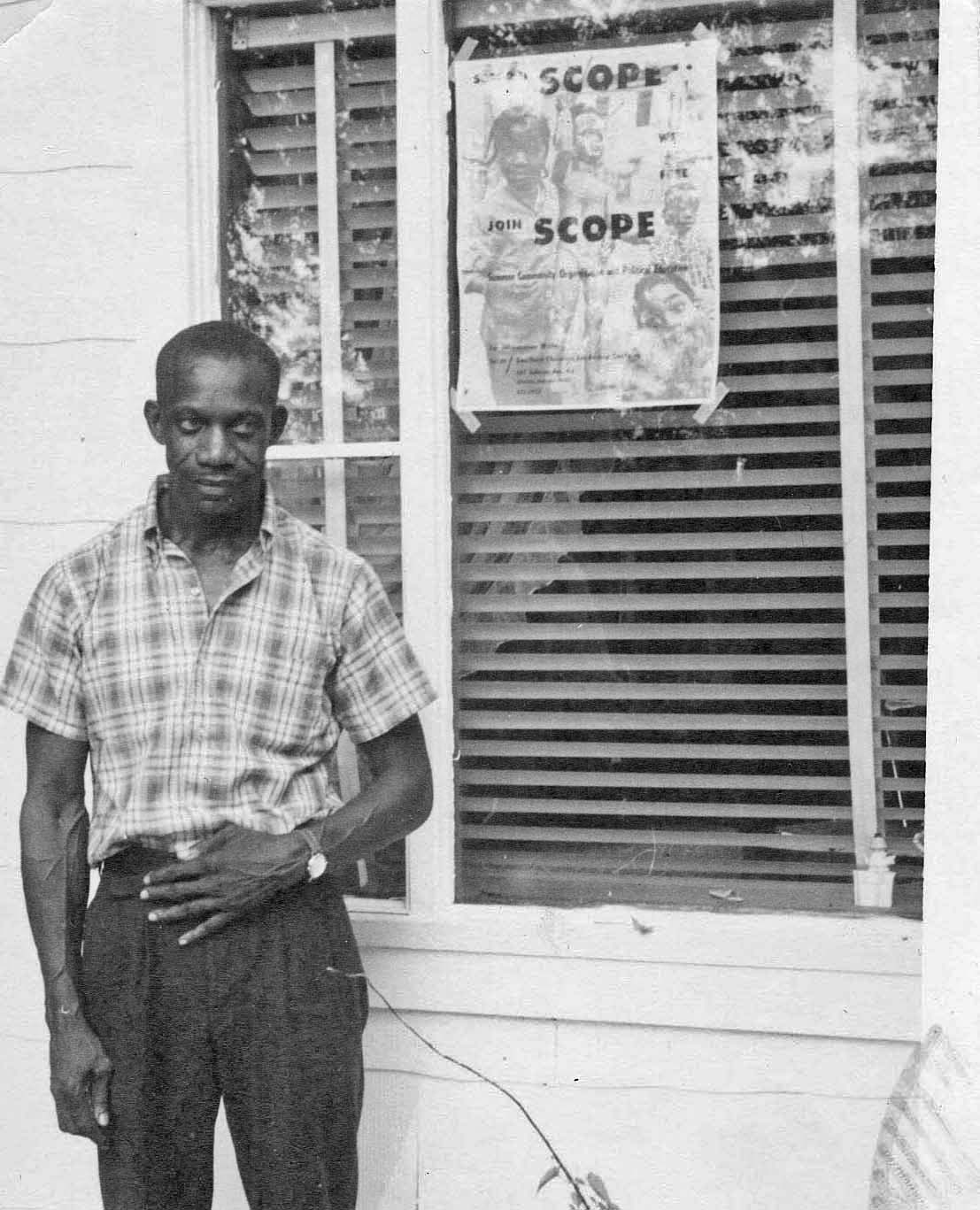 Hope Williams, Calhoun County, South Carolina
Hope Williams, Calhoun County, South Carolina
Hope is the most wonderful man one could ever meet. He had had no more than a second grade education, and though it is hard to tell his age, his is by no means young. He works in the fields himself, but has found time to register people in his county. Everyone knows him and respects him. They really love him, and he has done an enormous amount of work. He also runs citizenship classes. One is immediately drawn to him. He, his wife, and a swarm of kids (not all his) pack the small decaying house that is his home. It is in the middle of the fields, and chickens and cats run all around it. The inside is furnished by beds filling nearly every corner and wall, except where the TV is. While Pat went out in the fields to talk with Hope, we wandered around the house.
Taking handfuls of peaches with us, we went to the “town” where we would be centered. St. Mathews, the county seat has about 1,000 inhabitants. The whole county has about 6,000 people, and is 55+ percent Negro. The three of us girls are living quite comfortably in the house of an ancient minister, Rev. Howell. There is no running water inside the house, and there is only a couple of wood stoves — one for cooking on. We will have to cook for ourselves. The boys did not have housing ready for them, so they will spend one night with Hope. They will be living near us, though, and we will have an office nearby, too.
While they were investigating housing, we went to meet the neighbors. We stopped in some of the numerous tiny grocery stores and introduced ourselves. The people don’t come up to us, but when we approach them, they quickly trust us, and are extremely friendly. It is hard for them to know how to react to whites, because they have little contact with them, and when they do, they often get in trouble for it. The stores always look deserted, and it is strange to find they are being used. I really love them. We talked to our neighbors across the street. Then we met the boys in the Floyd’s Grocery Store, which is (our) temporary meeting place.
Everyone is so anxious to help us — it seems as though they are competing to see who can give us the most. We hadn’t eaten, so before Pat left us, the Floyds brought our spoons and bowls, set up a table and told us to help ourselves to anything in the store. They sliced up baloney and cheese in thick slabs, and we made enormous sandwiches right in the store. They gave us sodas all day long.
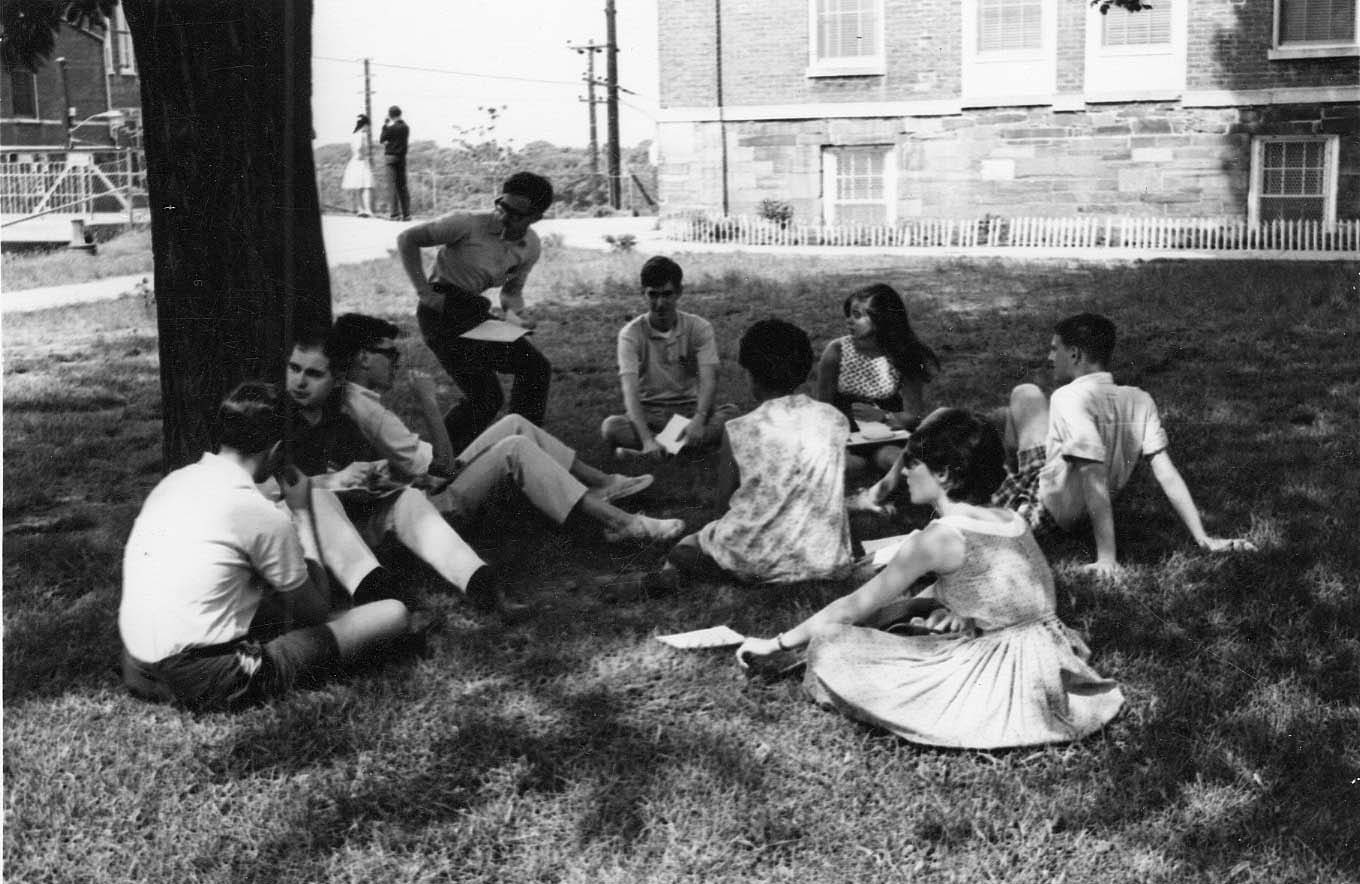 SCOPE training, Atlanta, GA, 1965
SCOPE training, Atlanta, GA, 1965
Pat left us waiting for Hope Williams to come. Mary Ann, Carol and I walked up the street to the school to see if anyone from the Head Start Project there was still around. Mr. Parker, who is heading it was around, and a few of the cooks were still there. We talked to them and arranged to come back and see the classes and meet the teachers.
Two boys were at the store when we returned. They are NAACP workers in Orangeberg County. They have also been around in Calhoun County. Some work has already been done here, but we are the first civil rights people to be white. Time will tell what the reaction will be. Mike and Joe really know what is going on.
Later Hope appeared. He is a wonderful man. I can see why everyone likes him so much! I am proud to be helping this man who has so courageously been struggling on his own. We decided our first action was to drive around and see the countryside, and to get to know the county. We must get some cars immediately, and one will not be enough. Canvassing will have to be done by car. We will also need to increase our number with Negro helpers.
We three girls went in the car with Mike and Joe, and we followed the boys in Hope’s powder blue pick-up truck. The county is very nice, but so spread out. One big problem will be the fear of the tenant farmers of their white bosses. We can almost always tell whether a man is a tenant farmer or not by observing if he drives a tractor, or walks behind a mule in the field.
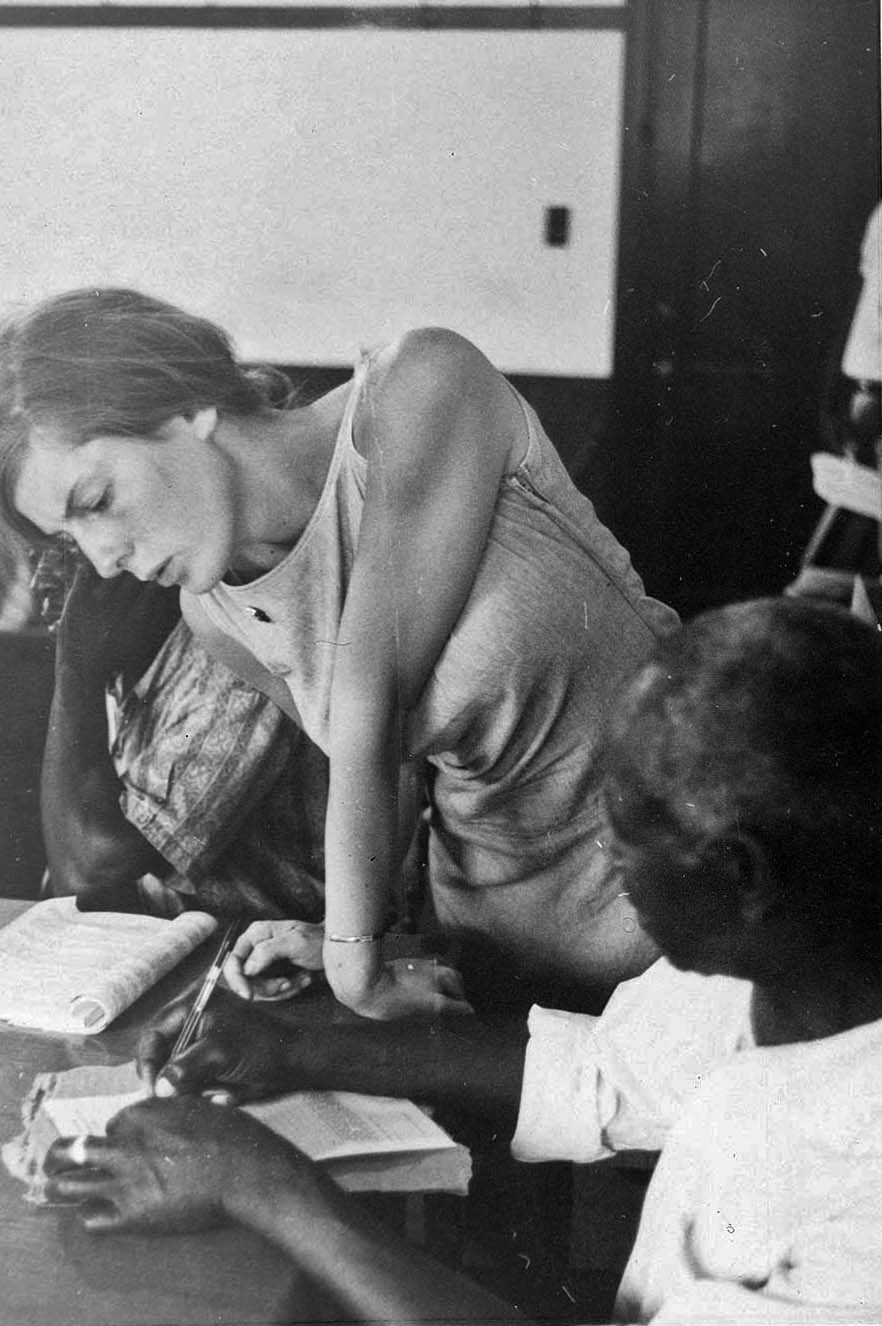 Civil rights worker Mary Ann, conducting voter education, Calhoun County, SC, 1965
Civil rights worker Mary Ann, conducting voter education, Calhoun County, SC, 1965
Mike and Joe are very well educated. It seems that they were able to get quite a bit out of the Negro colleges. We talked about a lot of things during the drive. I hope they will be able to help us.
We returned to our headquarters in the store, and stood around discussing what we would be doing in the near future. It’s really great how everyone gathers in the store, and sits around on upended soda cartons gossiping.
Mr. Floyd invited us into his house to sit down while we talked. All the houses are open to us to use whenever we want — relaxing, eating, bathrooms, etc. We just walk in. While we were there, many of the neighborhood men came in to meet us. There are a lot of very interested people, and Hope Williams gets them all fired up, and pitching in any way they can. They offer their kids, houses, and food. Any spare time they have they’re willing to give up.
Following this pattern … we were brought heaping plates of food from a woman’s café. An amazing assortment of side dishes came with our fried chicken….
July 8th
Today was adventure day for me and Mary Ann. Mary Ann got up early to see about a complaint someone had about a scratch we had put on his car. A $30 repair job is required. The police must have put him up to it, because he is a very timid and stupid man. She met us all at Harts, to start out on the morning canvass. I stayed with her in the car to cover some scattered areas we had missed canvassing before. Looking for a small road, we turned up a dirt path through some fields where we spied houses. The houses turned out to be deserted, so we went on around the soybeans and cotton. I had just suggested turning around when we came to a huge section of the path that was pure ooze. Mary Ann drove straight into it, and we stopped in the middle. Ugh! We took off our shoes, and stepped out calf-deep in mud. We dug the wheels out with our hands, and rocked the car. Nothing worked. After about half and hour and two of our posters, we managed to get the car out of the mire and into another. At last we got out of that too. We parked in the cotton, the only dry place. Mary Ann stepped out of the car, and suddenly, horrible noises issued out of the car. We had run out of water.
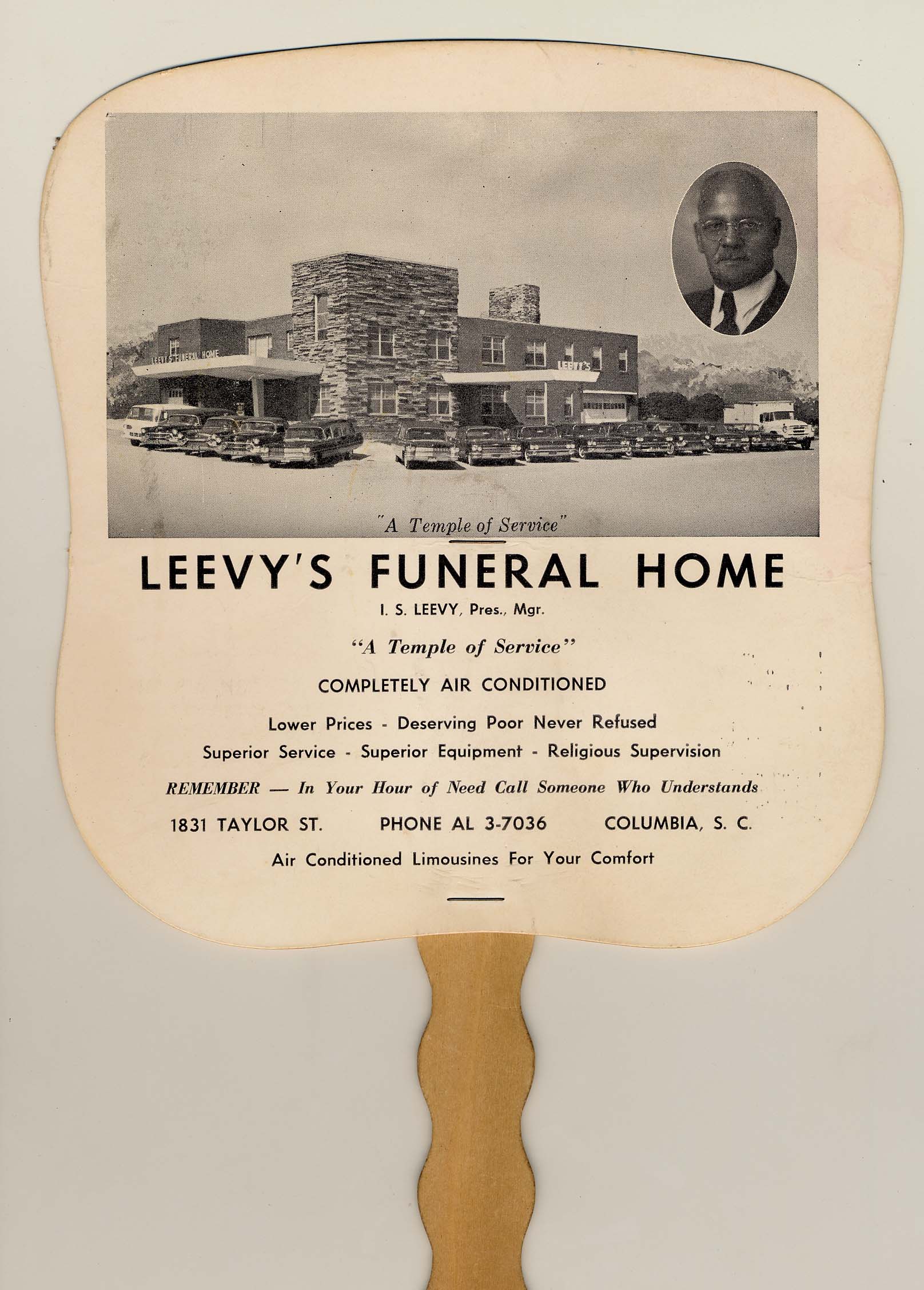 Voter registration Church Fan, 1965
Voter registration Church Fan, 1965
We hid the SCOPE material. With shoes in hand, we walked the half mile or so out to the road. What a sight! There was mud caked all over us. As it dried it cracked and fell off. When we reached the road no one was in sight. We started walking. Fortunately, Mary Ann had a white handkerchief and we flagged a car down after a while. The car was driven by a large white man with only one arm. Next to him was a huge shotgun. “You never know what you might find on these country roads.” Mary Ann’s answer was, “like a couple of stranded girls?” We played visiting vacationers, and he brought us to Creston, another booming town with all of one store. They were very nice (little did they know—I’m glad we weren’t a mixed group). We were given a can of water. Mary Ann drove our “friend’s” car back onto the dry path (with some pushing). Thank God! I thought we would never get free! That was it for our morning canvassing. The other groups were just ready to go back for lunch.
It took us a long time to get ready for the afternoon’s canvassing. It is impossible to organize things except at the last minute. The kids, in general, are not reliable, and we can’t ever count on them to show up. Sometimes they appear when we’re not expecting them, and everything must be rearranged. Some of the kids are excellent canvassers—better than we are—because they know the people and can talk to them. They know how to reach the people. We canvassed a new area to the west of St. Matthews. I drove the car out (and ran out of gas) and worked with Betty, who was quite ineffective except in lessening the distrust of me as I explained myself.
The Andersons across from the Harts gave us dinner. It was another enormous meal with 15 vegetables to go with the fried chicken. We had to rush off to our first mass meeting in Calhoun County—what a success!! It started out with freedom songs. Then we explained SCOPE and voter registration. The meeting ran like a clock. People stood up and said wonderful things on our behalf. Our plea for support (especially cars for canvassing and registration) was answered by the community. The leaders and others pleaded with us. They asked for the people to take care of us while we do our work. Some really great speeches were made, and we know everyone was behind us. We were thrilled!
July 11th
Sunday—the day of rest as I’ve said before—Ha! We split up, and covered nine churches in groups of two or three. We took turns giving a fiery speech to get the people to register and to urge their neighbors to do the same. God has unlocked the door—you must open it. Register!
Sunday dinner we picked up at the Jacket—hamburgers, French fries and milkshakes. We ate them at home. The entire afternoon was spent planning and we kept going right through supper. I was running back and forth in the car to the Harts’ making telephone calls. It was difficult to get people and cars definitely committed.
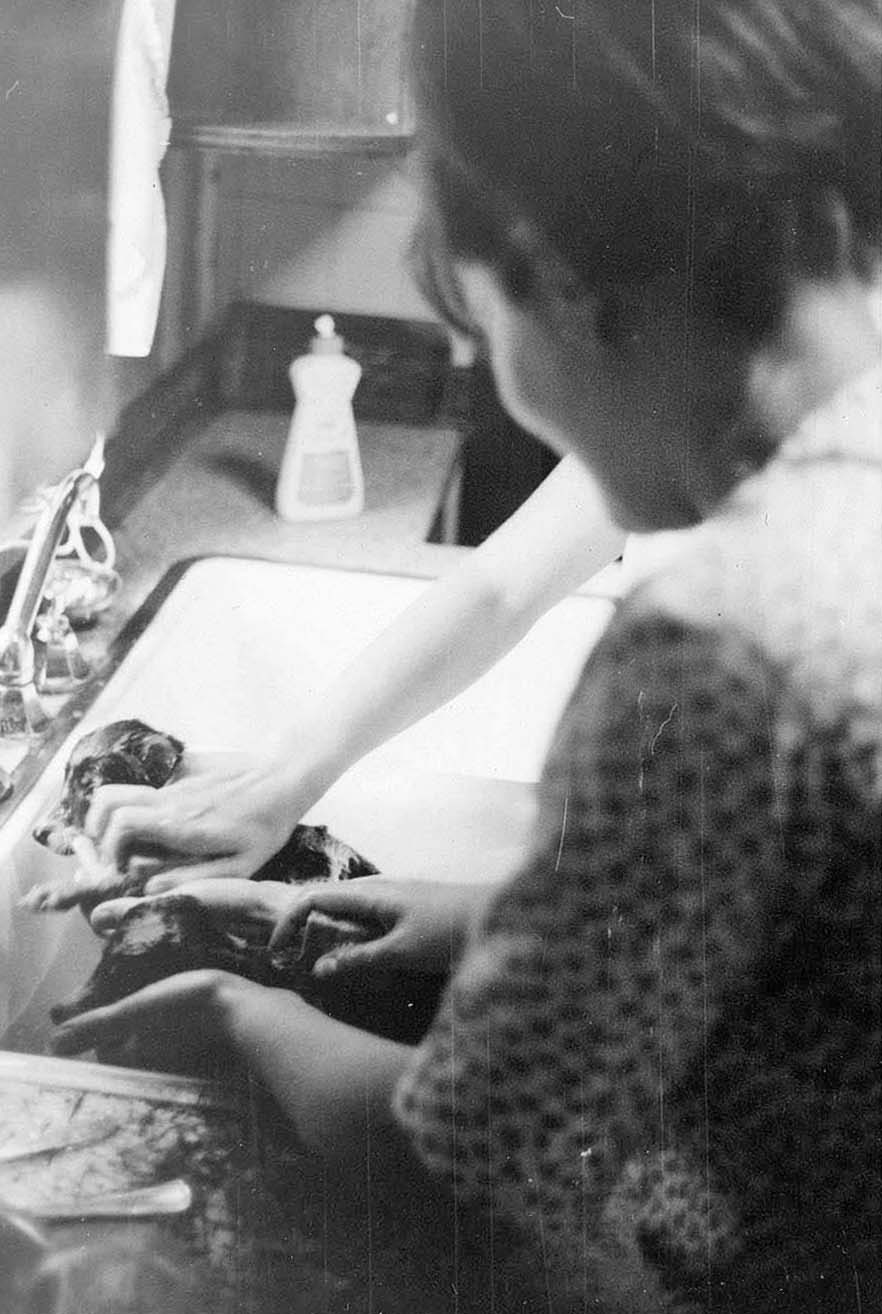 Rescued puppy, Calhoun County, South Carolina, 1965
Rescued puppy, Calhoun County, South Carolina, 1965
At about 9:00, Carol, Butch and I went to the Jacket to pick up some fried chicken. What a riot! The people were so shocked at seeing us with a colored boy. We brought Butch home and returned to get our order. The lady took an incredibly long time. She stopped in the middle to make some phone calls, and made all kinds of excuses. Meanwhile we bothered her even more by talking to all the colored people who came up. We know almost everyone.
Carol and I made phone calls until after 1:30. We got home—Terry had come to pick us up because he was worried—and worked until quarter to four while everyone slept. We made signs for the car and played with Hope and Scope [stray puppies we adopted]. They are so much fun to have around, and quite a panic—always falling all over themselves.
July 12th: Voter Registration Day
It was raining when we woke up at 7—damn! We were sure very few people would come out in the rain—it was just that excuse they were looking for to not register. Our disappointment was even more when we drove up to Harts to see not a single car or person to help us. I was about the second car out. I drove our “Registration” covered Chevy out to Mack Hill with Carol and Harold. They went into the houses to get the people out. The pouring rain turned the unpaved roads (these people need to register!) into mires. The red clay is slippery and the road slopes into deep ditches along the sides. It wasn’t too hard to get stuck—the car slid right into the side. The boys along in the car got covered with mud as they pushed me out. I’m glad they were there; they knew how to get the car out. I went back to the courthouse with only one person—someone else could go out to Mack Hill, or walk the area. Mr. Fedrick offered to do it.
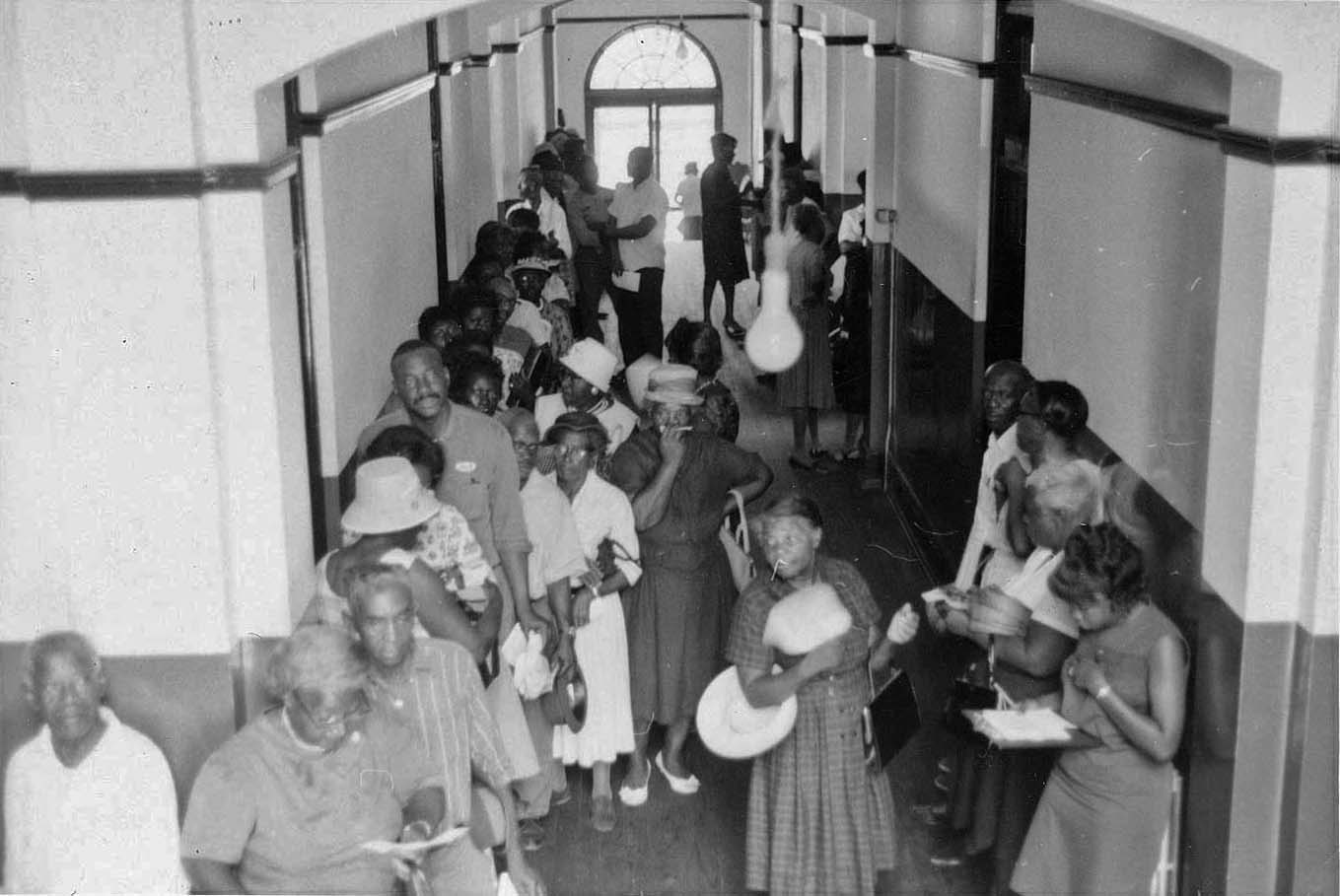 Registering to vote, Calhoun County, South Carolina, 1965
Registering to vote, Calhoun County, South Carolina, 1965
We got to the courthouse and… a line of people wound down the stairway to the registration room. Such elation I felt I can’t describe. Wowee!! At least 30 people were already there.
Harold and I went out again to pick up some people out towards Cameron. Each car as it went out received a map and cards. The cards were marked as the houses were contracted. I picked up three people and brought them to St. Matthews. All dirt roads had to be forgotten about.
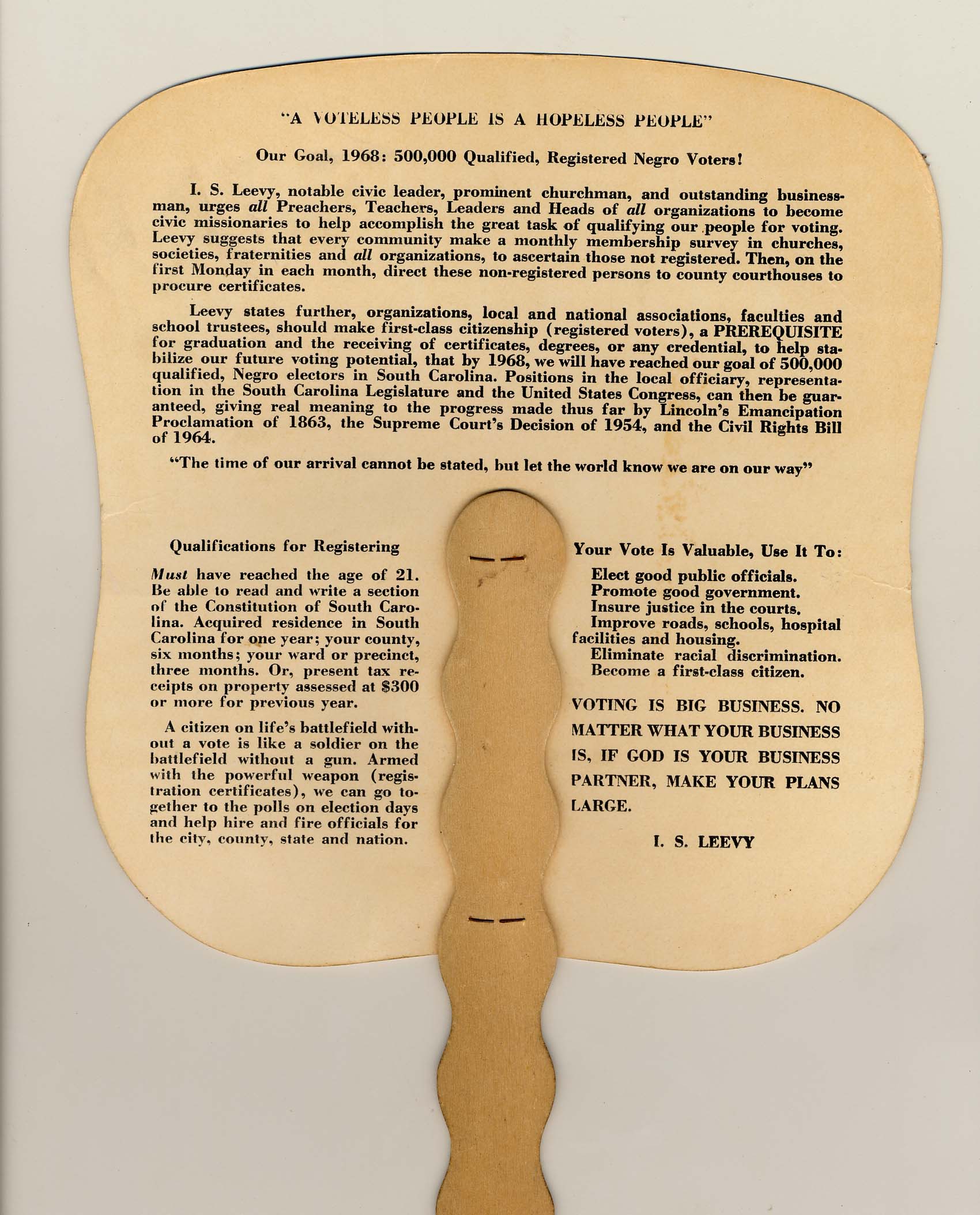 Voter registration church fan, 1965
Voter registration church fan, 1965
Panic prevailed at the courthouse. Many more people were needed to stay there. Sample forms were filled out again with most people. I went out to get gas in the car, and on the way stopped at Hart’s. Oh no! Two FBI agents were there—to interview us of all things. They couldn’t have chosen a better time—ha! Agent Friday brought me out to his car to talk in private. We lit up cigarettes and proceeded. First he showed me his I.D., then he told me that assistant Attorney General Douer (sp?) had requested the investigation for a possible harassment case. We each made three to four page signed flowery statements which we may be called on to testify on in court. This took an hour each of our precious working time. Carol and I went back to the courthouse to pull things back together. Thank goodness we had NAACP and SCOPE people helping us who knew what to do and kept things running.
[Slight incident — Carol and another boy (Freddie from Orangeburg Scope) were walking up town. A white man was furious. He attacked them and grabbed their forms away, asking them what they thought we were doing.]
I drove John back to the Harts’ and picked up some pens. Then Dick Miles suggested I contact the U.S. District Attorney about the slow-up. Back to the Harts’ again. I told Terrell Glenn about the situation—only five people registered in the first hour. All sorts of illegal things were going on—even interpretation of the Constitution. Earl [Earl Coblyn was our local attorney] tried to stop it, but as soon as his back was turned they started again. Earl had to leave, telling us to ring Matthew Perry if anything happened. Later Shelly Rosen (from Orangeburg) got into the room to watch the registrars. He had quite a time keeping track of them, and had a long list of complaints and names. Attorney Glenn said not too much could be done immediately, but apparently he received so many calls, that word was sent down. The lines began to move a little. He promised me he would call the county attorney to look out. Earl Coblyn later said he had been in Glenn’s office during the afternoon.
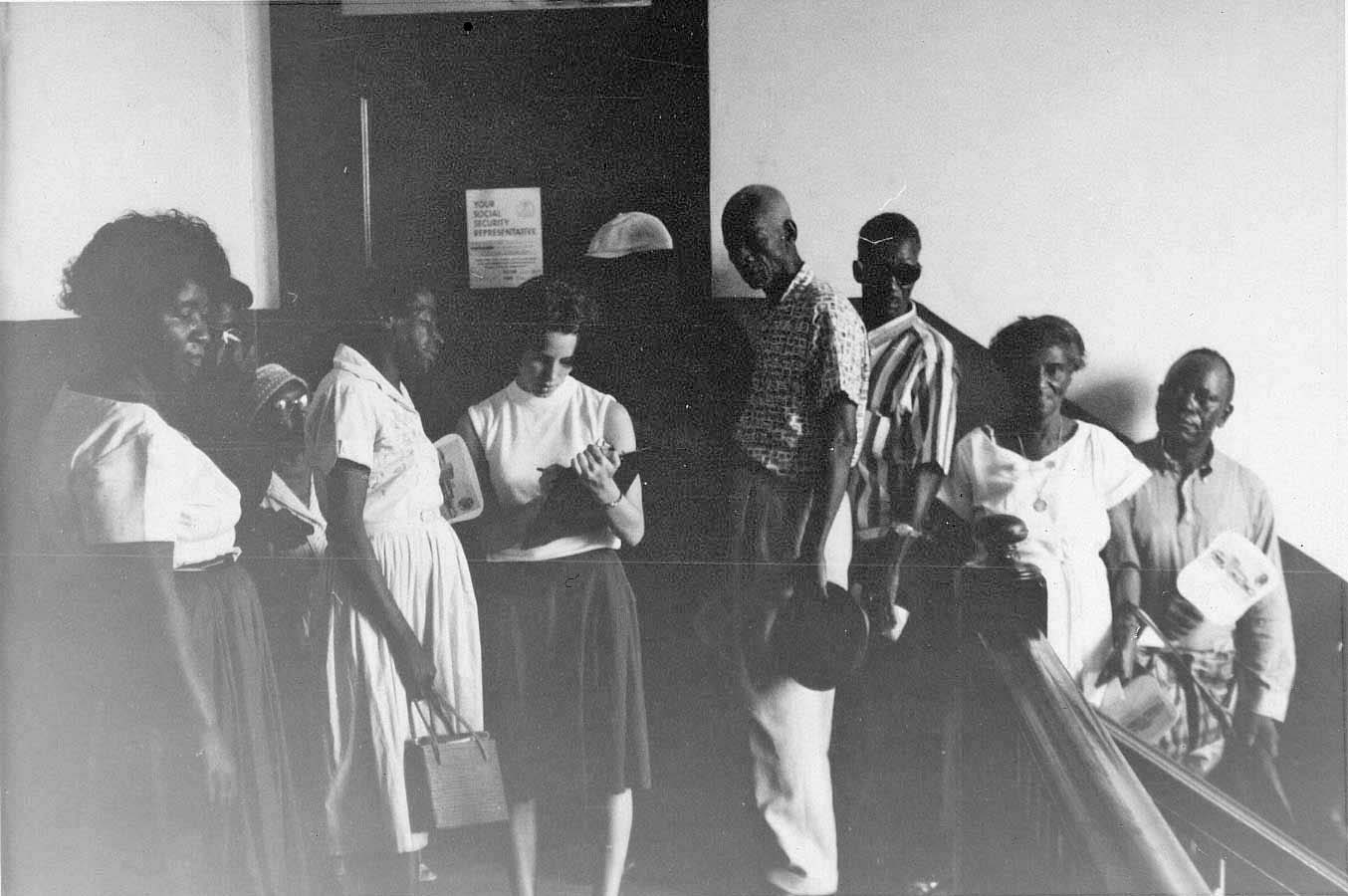 Registering to vote, Calhoun County, South Caroline, 1965
Registering to vote, Calhoun County, South Caroline, 1965
Terry and I went back to our house to get a camera to take pictures at the courthouse—the line was incredible; it wound down the stairs and down a hallway. The people stood all day or sat on the stairs. It is interesting to note that almost all of the people are older. An entire generation is missing—those in their 20’s and 30’s.
[diagram of the courthouse stairs]
At one point we brought Kool Aid down in large jars and passed it out, and another time we brought hundreds of candy bars. The workers had sandwiches on the job prepared by some of the women.
At two o’clock I began helping inside the registration room. The registrars found we were more help than bother, and we began the exhausting job of laboring with the people over the ridiculous form. Many people could barely write, and labored over each blank as we told them what to write; sometimes letter by letter. It was sweltering in the room as the sun came out. I was about to faint as five o’clock approached. The registrars were nice enough to finish with all the people who were in the room at five. Anyhow, about sixty people were turned away at the end. The last people who go through at quarter to six had come at about noon. People waited about six hours and were not registered. I felt very distressed as these brave people, most of them hardly knowing what was going on, standing in that heat so patiently. I couldn’t believe them. They want so little, and no one will give it to them. I wanted to cry. What poor, poor people.
I have never been so pooped!! After three hours of sleep the night before, and running all day long—whew, what a time! We said goodbye to all our helpers and went home. We lay down for a while and talked about the day. Then Earl stopped by. As usual we sat for ages with him and gabbed. We asked him to accompany us to dinner. He led us to Quick Charlie’s Dairy Bar. Quick Charlie is a special friend of Earl’s and we got delicious food there. We even had some “on the house.” We stood around and ended up going over to Quick Charlie’s house. He owns two (there are wealthy colored people). The house we went to, following his yellow T-Bird, was beautifully furnished with all sorts of extraordinary objects. We called up the Orangeburg kids who arrived soon after with booze and spirit for the party I wanted. It was really fun, and I would have really let myself go if I hadn’t felt sick for being so tired. We left the Orangeburg kids enjoying themselves, and I drove everyone home—to bed. Ah-h-h. What a happy day!
Tuesday, August 2nd: Jailhouse Notes from the “Pink Palace,” Orangeburg City Jail
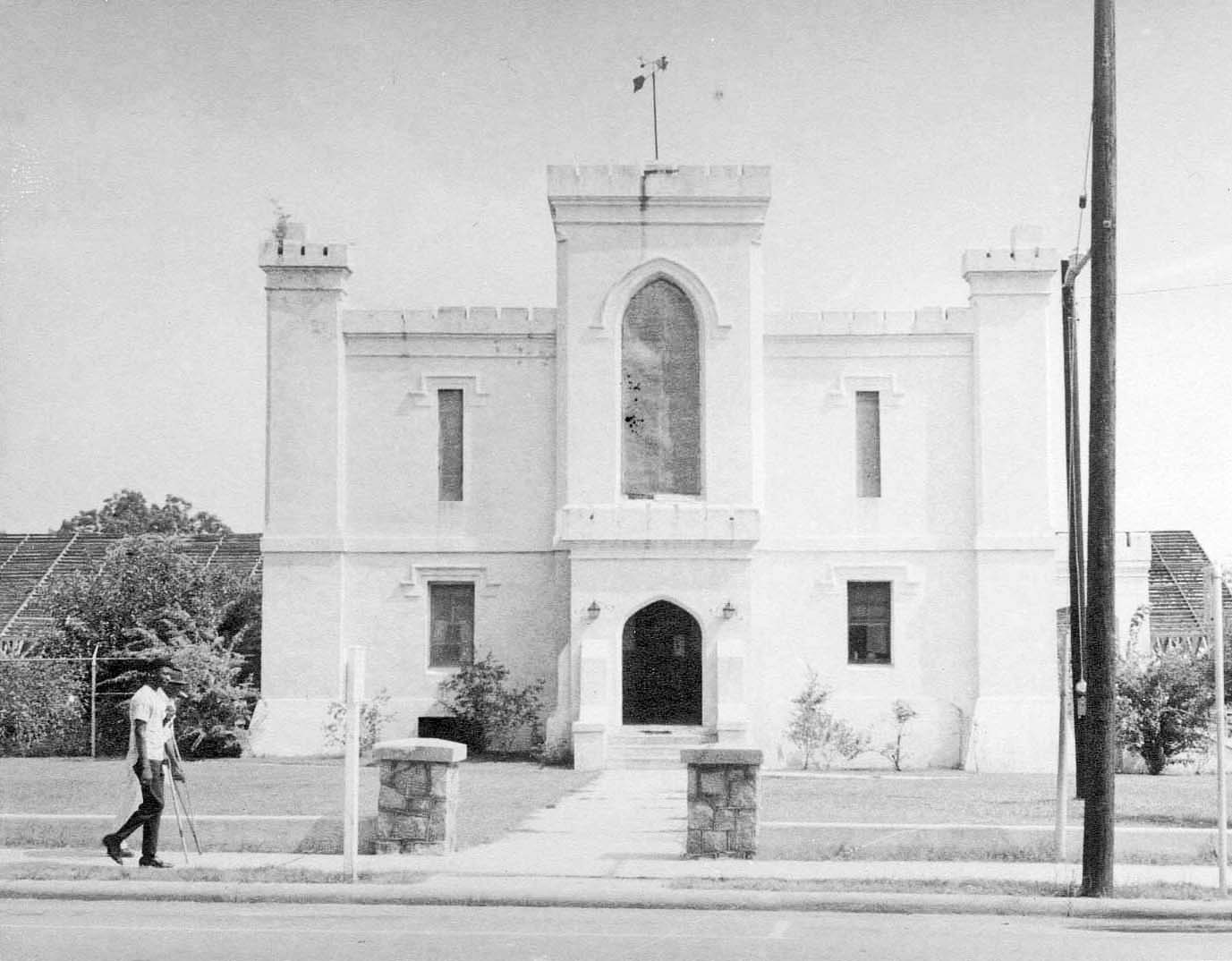 "The Pink Palace," Orangeburg City Jail, South Carolina, 1965
"The Pink Palace," Orangeburg City Jail, South Carolina, 1965
We were arrested today. I was not scared. I cried when a two ton policeman stood on Al’s neck while hauling another limp body (Lenny’s). I am hoarse from singing and yelling.
Why were we arrested—no charge. We were pulled from the courthouse.
Yesterday Orangeburg had a record registration day—so did we!—they registered 350 people and had three registrars (even a fourth). They were allowed to use the courtroom—so everyone could sit down. It was cool, quick, and comfortable.
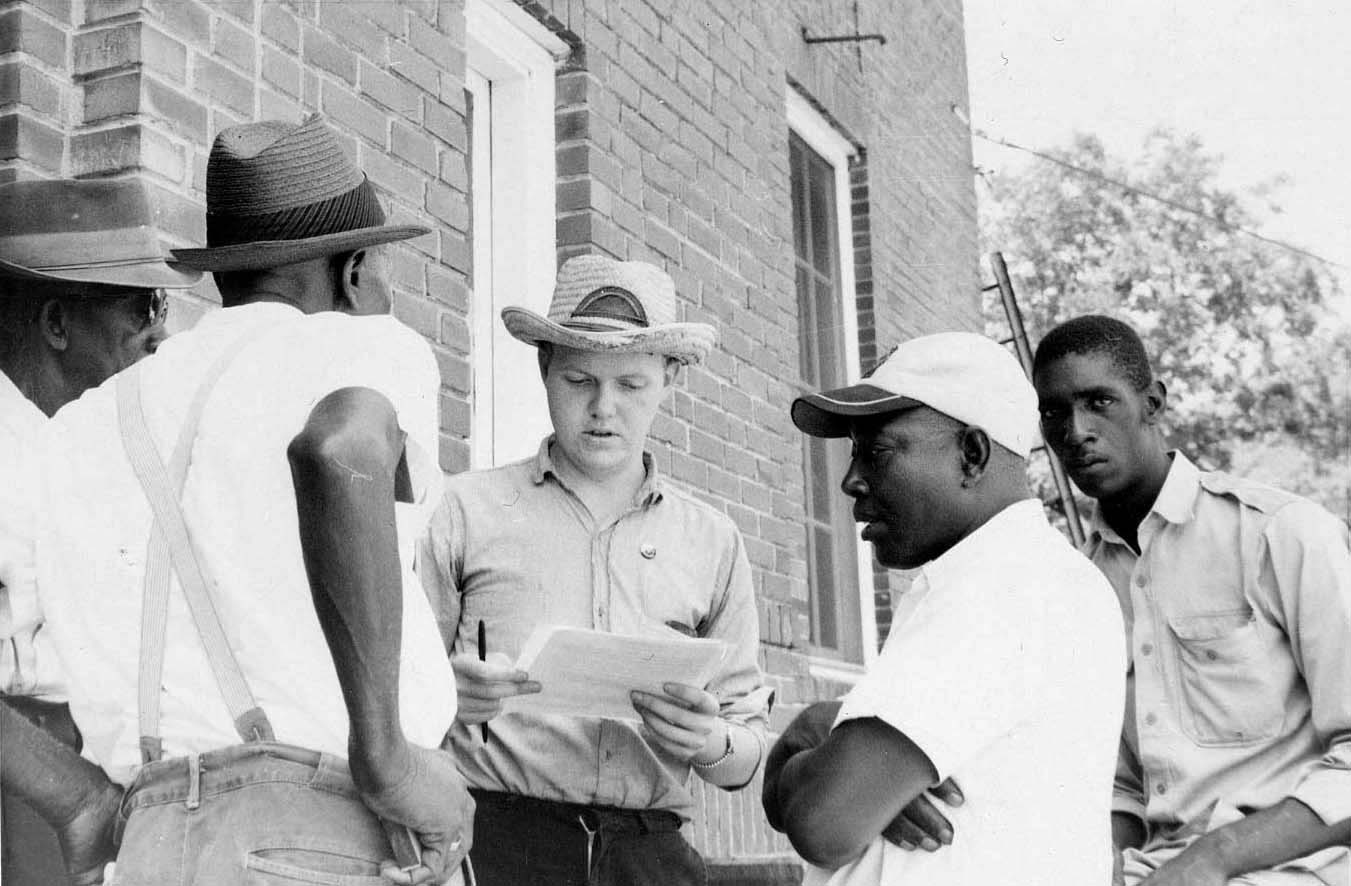 Voter registration, Calhoun County, South Carolina, 1965
Voter registration, Calhoun County, South Carolina, 1965
Today was another registration day. Mary Ann and Alan went down to help since we didn’t have extra days. At three the rest of us got a call—come down by four. There had been only two registrars, and one left because he didn’t want to register any more ‘niggars’. People were being asked to read. Those bastards!! No—we won’t put up with it. At five we would stay. Calhoun was asked to support the sit-in—of course we would.
We talked to the people, telling them to stay. We sang songs and marched around the courtroom when the officials left. We opened the windows and let the city hear us. There were posters with slogans—they went up on the windows. All the adults left except three because they couldn’t be arrested. Our decision meeting was short we would stay ’til 9:00 tomorrow, or be arrested. The arrest was our own decision, Earl was there and told us everything.
Sheriff Dukes came in. Suddenly, on both sides of the room husky men in uniform poured in. they stood on each side as we announced our decision. They rushed on us as we sat and sang, jumping over the seats. We were 53, they must have been more.
I was picked up and thrown. Then I was grabbed and dragged outside. As I passed Earl he encouraged me to try to walk. In front of me John and Al were dragged by the hands down the stairs and thrown into the car in a heap. My picture was taken. Al’s hands were bent ‘til they almost broke. Dozens of cars pulled up to the courthouse, with all of us singing. We were piled, pushed and thrown into the jail. Then we were split, and some of us were led around another way. We stood and sang songs while we waited for them to get our names. Fifteen girls are together in a revolting dirty cell with three beds. There is a toilet in the room that is disgusting. Also a sink and bathtub. We were finger printed and photographed. Juveniles were led out if they wanted. Butch was arrested with us.
August 12th: At a Three-Day SCLC Convention in Birmingham, AL
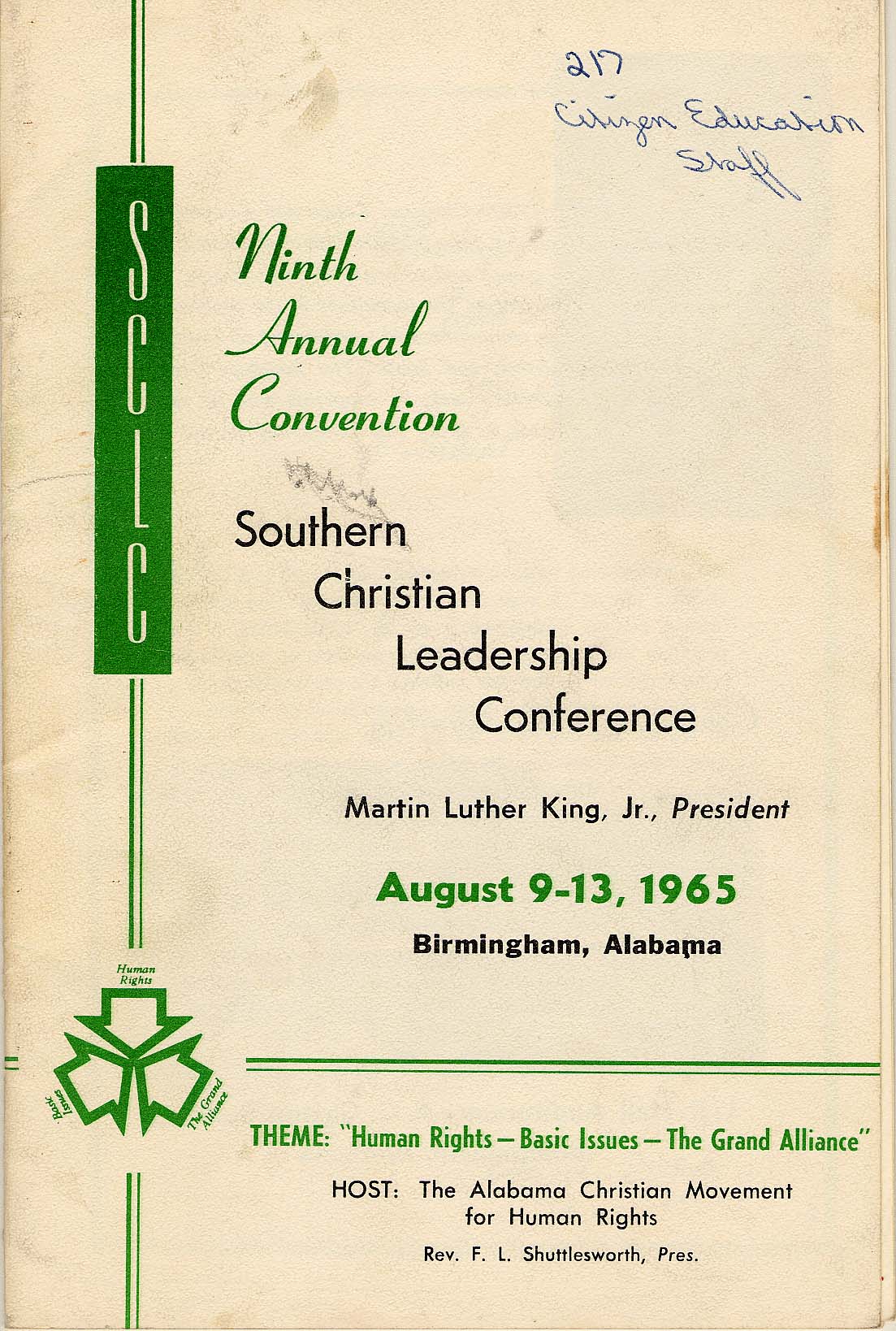 SCLC convention booklet, Birmingham, AL, 1965
SCLC convention booklet, Birmingham, AL, 1965
…Reverend Martin Luther King gave the annual President’s Address. This is the 9th annual convention, and it is significant that it was the 10th anniversary of the Montgomery boycott. King spoke of all the present programs being carried out by SCLC—SCOPE, political education (citizenship schools + writing clinics), Operation Breadbasket (economic boycotts), Dialogue (to awaken the people and get them talking and thinking) and Vision (to prepare kids for college).
The word has changed—now it is “march”. March and demonstrate until more registration days are granted.
It was stated that we must really struggle, and not relent until we have won. At the end of the speech the audience was asked to stand in support for what King had said, and in an endorsement of his policy.
1 white man then got up and belted out a beautiful song; “I told Jesus it would be all right if he changed my name”. Afterwards King introduced Rev. Andy Young for the keynote address. Andy is a very good speaker. He seems to talk to every person individually. He touched on many things. The convention was very concerned about the situation in Viet Nam.
As Andy put it, “There is no sense in integrating a society that is in danger of being blown out from under us.” This whole situation can be alleviated by an enlightened electorate.
Andy brought up the new sense of the movement as SCLC now sees it. We need more than non-violence as the blatant wrongs of the segregationists subside. Our own shortcomings will be visible and we must search more for the truth….
August 18th: St. Matthews
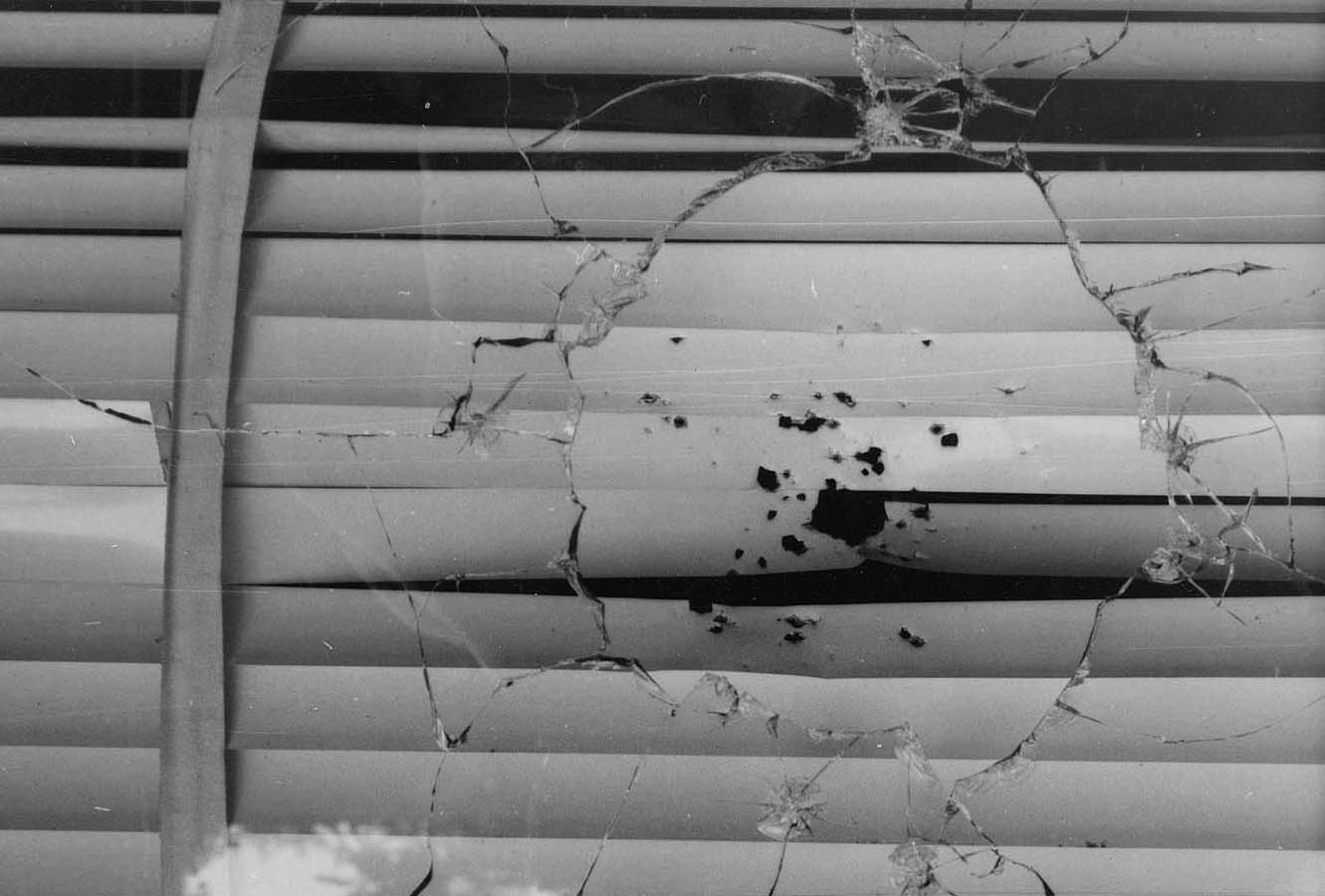
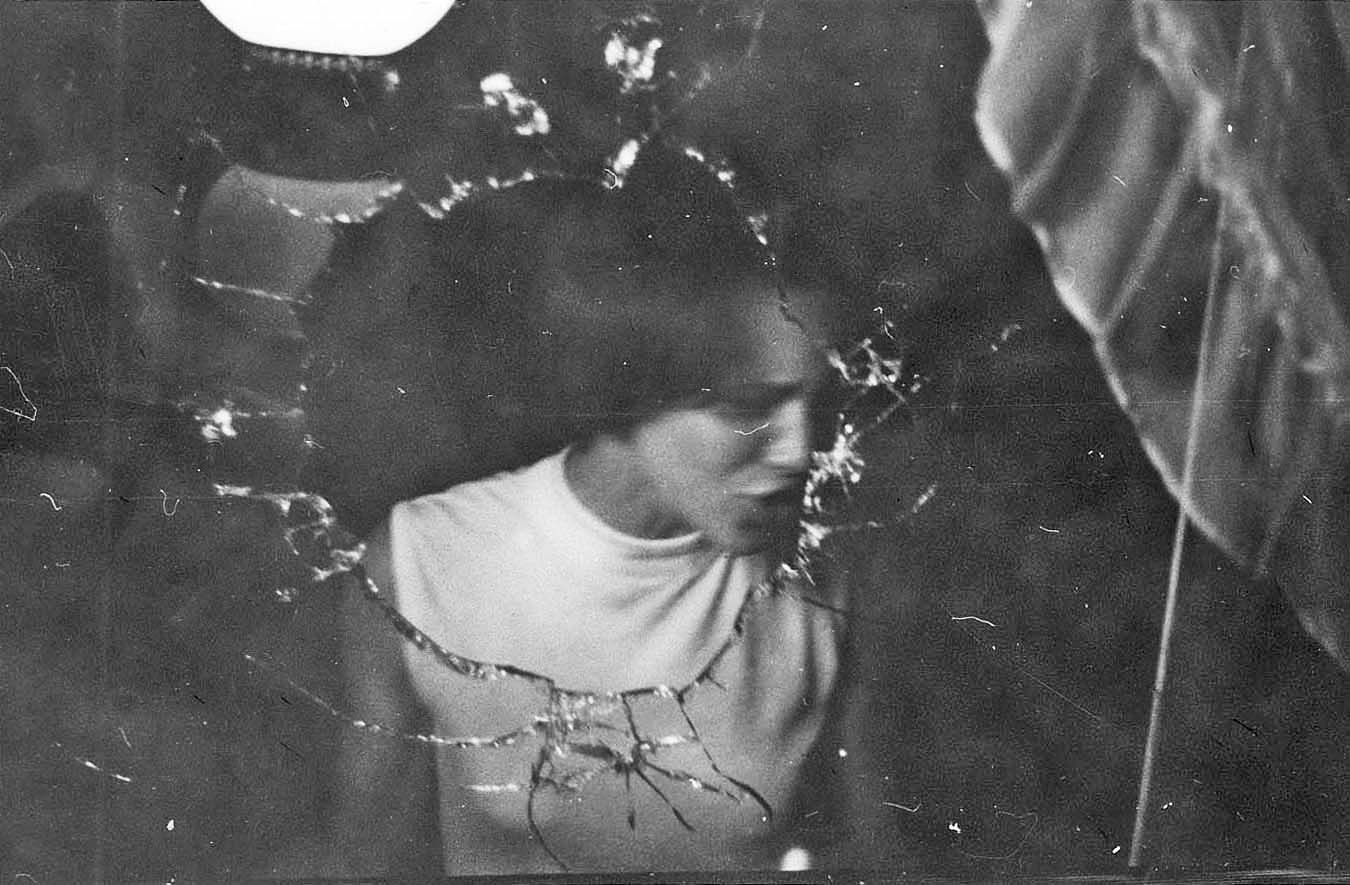 SCOPE House window after, with bullet holes and shattered glass
SCOPE House window after, with bullet holes and shattered glass
Thais drove me over to Sultan’s in Regi’s car to get the station wagon. I drove back to the SCOPE house to pick up Jim (less finky than John). Just as we were driving out Earl drove in with Mary Ann. So we waited for her to have dinner. I called up St. Matthews to tell them we would be about another ¾ hour. Then—Shocking news!!!!!
Some time between 8:00 and 9:00, when no on was home—our house had been shot at with a shotgun. Ulp! I was suddenly nervous. I ran back to the other SCOPE house and told Earl. He did not believe it had been a shotgun. However he hurried and offered to accompany us home. Three cars went to St. Matthews, filled with people.
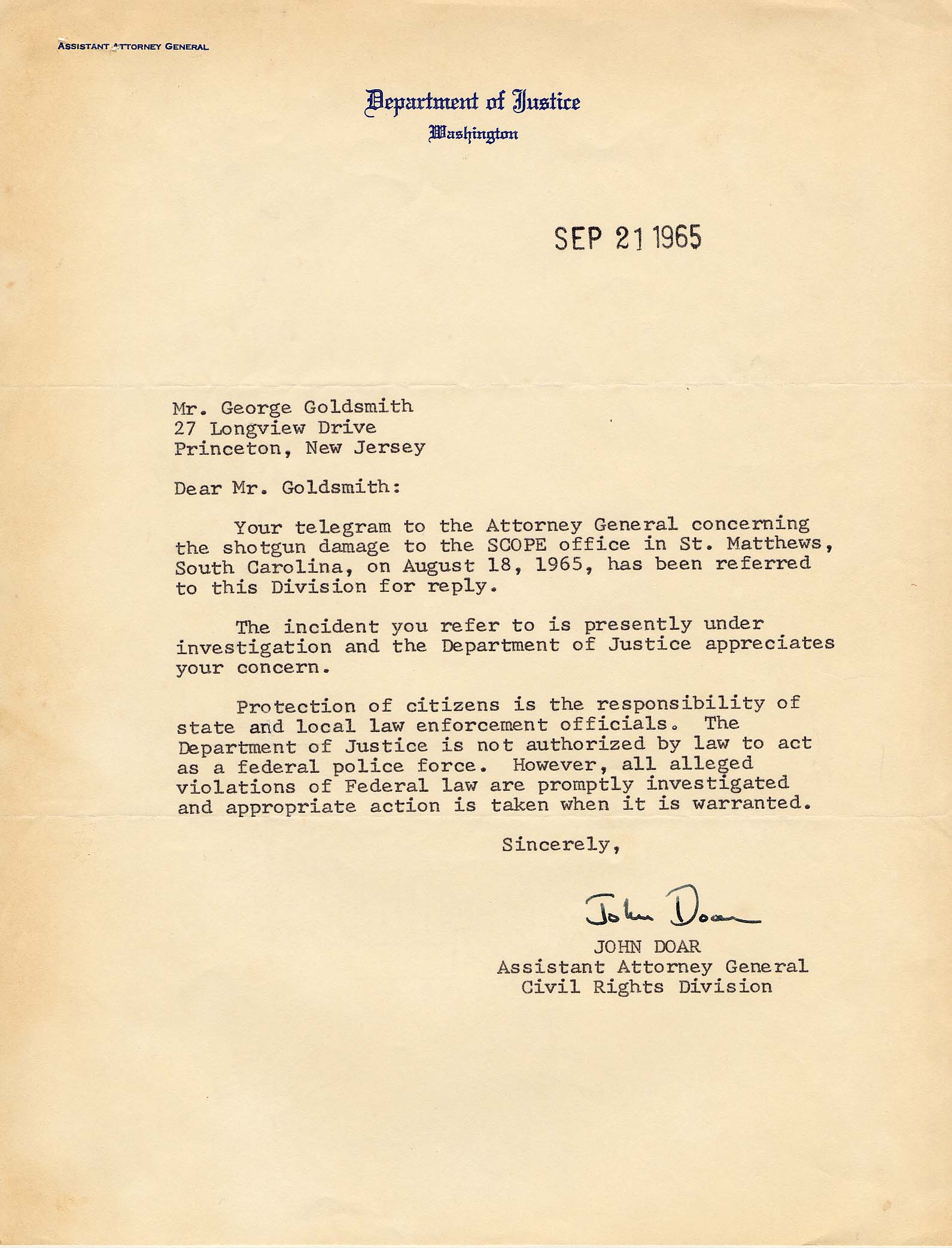 Assistant Attorney General John Doar letter to George Goldsmith, 1965
Assistant Attorney General John Doar letter to George Goldsmith, 1965
What a sight! A hole about a foot in diameter was in the front picture window. The whole glass was cracked in all directions. The shade was drawn, and splattered with shot holes. But that was nothing—the inside was utterly unbelievable. Shattered glass was strewn over every inch of the room. Not a place was left uncovered. The back wall was dotted with holes. The whole place was a shambles. Everyone stood around—amazed.
The police had been by and looked things over. They said they would return with the sheriff in the morning. F.B.I. was contacted, and also U.P.I. We called Chief Strom for protection during the night. Matthew Perry was also informed of everything. It was still scary. Earl and the Orangeburg kids left us making precautions for night. Our beds were moved and windows blocked. Pleasant dreams!
August 28th
My last day, and a hard one! I got up at 9:00—oh exhaustion!!
I didn’t realize how upset Gerard was. He was already waiting downstairs for me; puffing away cigarettes. I couldn’t really talk to him at all. We sat outside with some of the other kids while I waited for all the last minute things to be taken care of—phone calls, breakfast, packing. Gerard and I really grossed out a local Uncle Tom who stopped by to say hello.—we were standing on the steps with our arms around each other. The man left quickly.
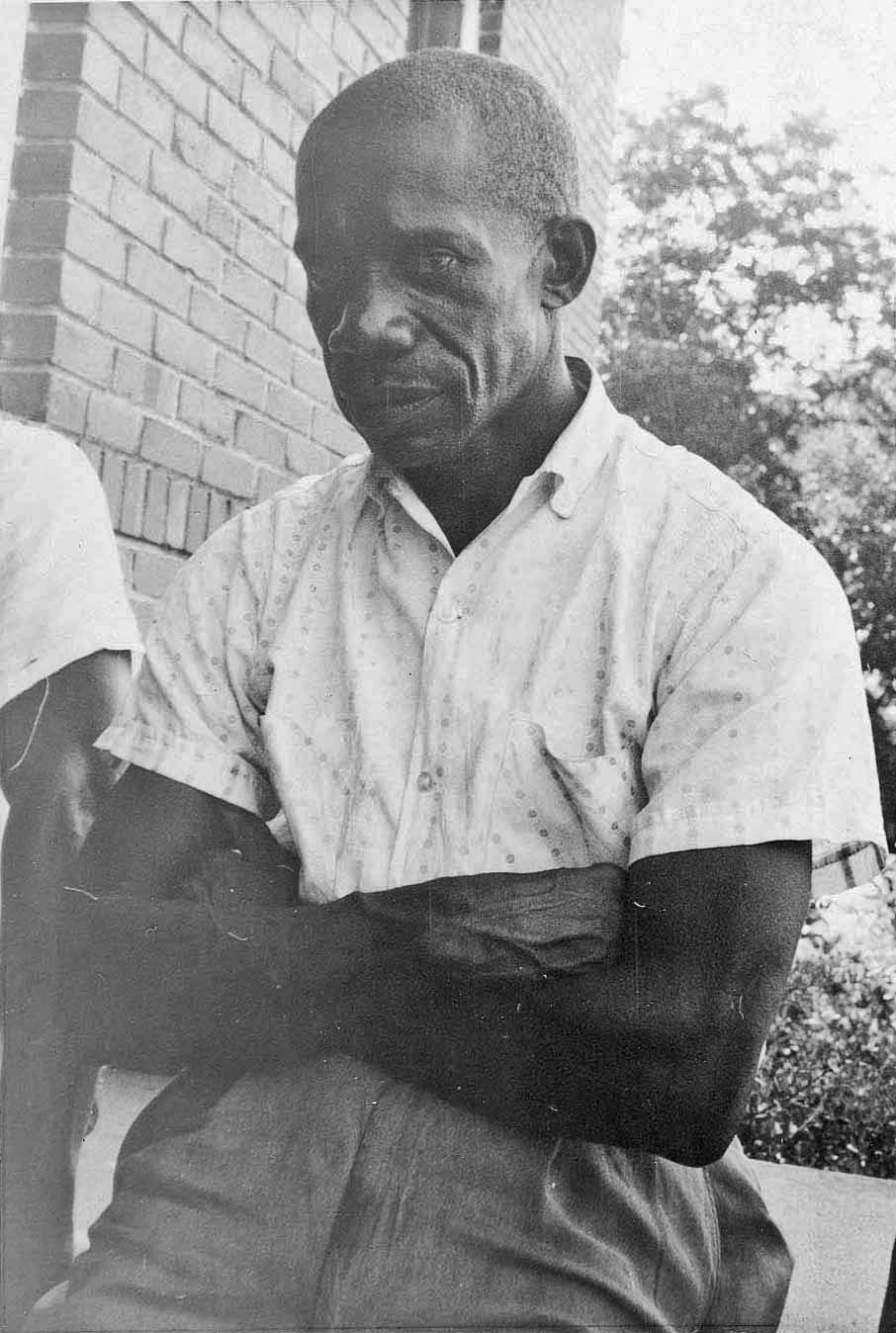 Hope Williams, 1965
Hope Williams, 1965
Citty was packed, and we said good bye to everyone. When we got to St. Matthews, everybody was cleaning up the house. What a chore! We certainly hadn’t taken any pains to keep the place neat! It seemed like a hopeless task, but we did make some headway. The car, when we got around to loading it, was quite burdened with five people’s luggage and other various belongings. It was a real rush to get finished in time for our last luncheon invitation. We did it though.
Lunch was at the Flood’s house, and very wild. Saturday is a big day, and every person is extremely high and in good spirits (excuse pun). The house was jammed with friends and relatives. The music was blaring so we could hardly speak. People pranced around, slapping each other and talking too loudly, like you do when you’ve had too much to drink.
We were seated in the living room and offered beers. Dinner was late —but not surprising!—a spread to beat all meals we had had all summer. The team of women had gone all out to provide the most sumptuous meal ever prepared. Chicken, turkey, pig pieces, rice, noodles, beans, and endless other things. All we could do was taste some of the things. It was difficult to leave, because the people kept hanging on to us. The men wanted to dance, and the women found lots they had to say.
I was a wreck. One of the things I dislike most in this world is saying good bye. I can’t tolerate it. The only way I can remain sane is to say good bye and leave….
August 29th
The last push! It was quite a push, too. Being me, I didn’t hear either alarm clock. Lesley got me up, and first I had to fight the freezing cold. That was quite a shock! Then I had to wake the others. That wasn’t very easy.
Mrs. Straley was so nice to get up and make us hot pancakes for breakfast. We struggle very hard, and were off by 6:30, with me driving. It was a long haul, and we were all anxious to get back to the North.
A civil rights trip wouldn’t be complete without a flat tire—and we had one! It was certainly good we had stopped to get a spare which was usable. When we stopped it was COLD! The wind blew, and for the first time all summer we needed sweaters and coats. We continued on our way, stopping only for gas and food.
The first time I felt really out of the South was when we approached Washington—familiar territory—home of friends. I almost felt as though I knew everybody—people even looked different. I still had a feeling of comradeship with the Negroes, but the natural feeling of hostility towards all whites was growing less.
Speaking of everyone’s being a friend, when we stopped in Delaware, we did find friends. It was uncanny to bump into them there. In fact Carol left us there to continue her ride home with a girl from Brandeis.
I was very excited on the drive through New Jersey to good old home in Princeton. I didn’t have to worry about the fact that I was ready to drop from exhaustion—I couldn’t relax.
At last I was home. Now to unwind and think, and to wish I were back again.
- About Us
- About Our Collections
- Online Exhibits
- In-Person Exhibits
- Research Guides
- Collection Essays
- Records Management
- Library Home
- Home
The Diary and Papers of a Young Civil Rights Worker Exhibit
- Exhibit Home
- Background
- Dedication
- Diary: June - August 1965
- Resources
Dedication
This exhibit is dedicated by Lynn Goldsmith Goldberg to her father, Dr. George J. Goldsmith.
